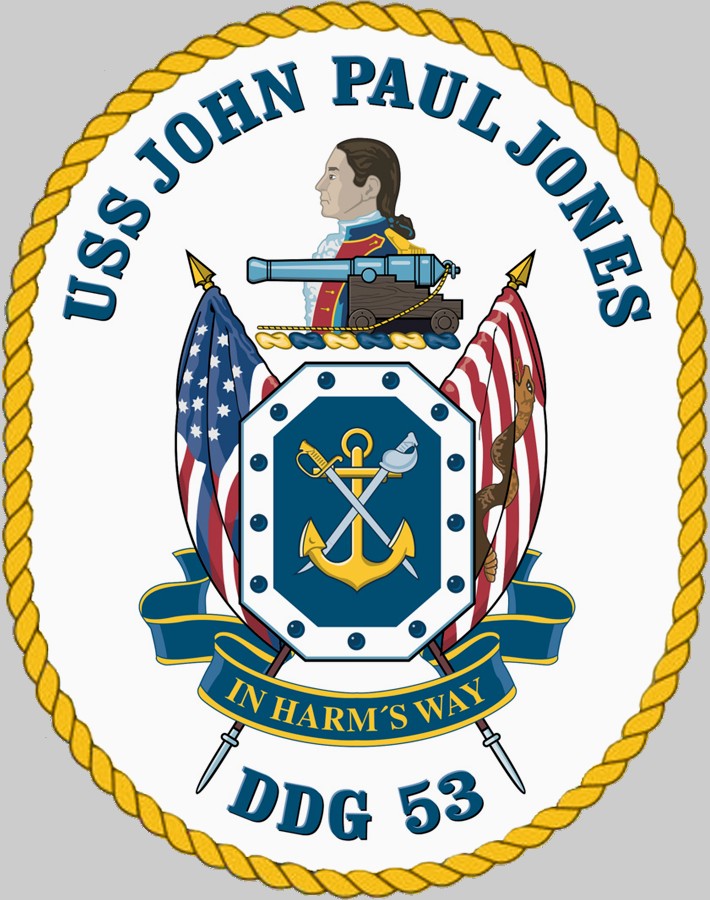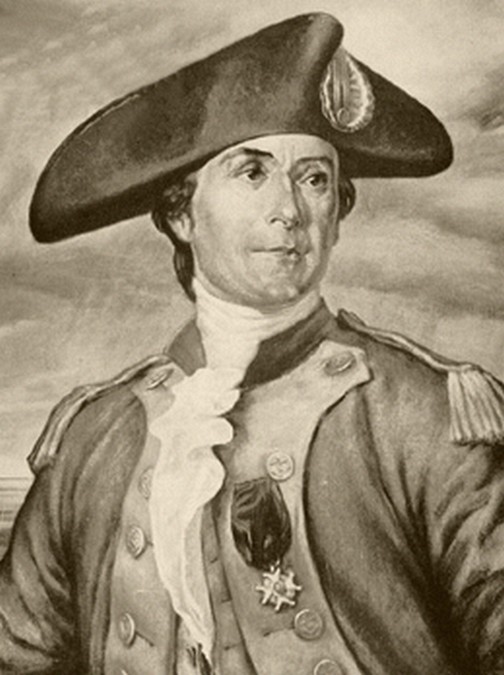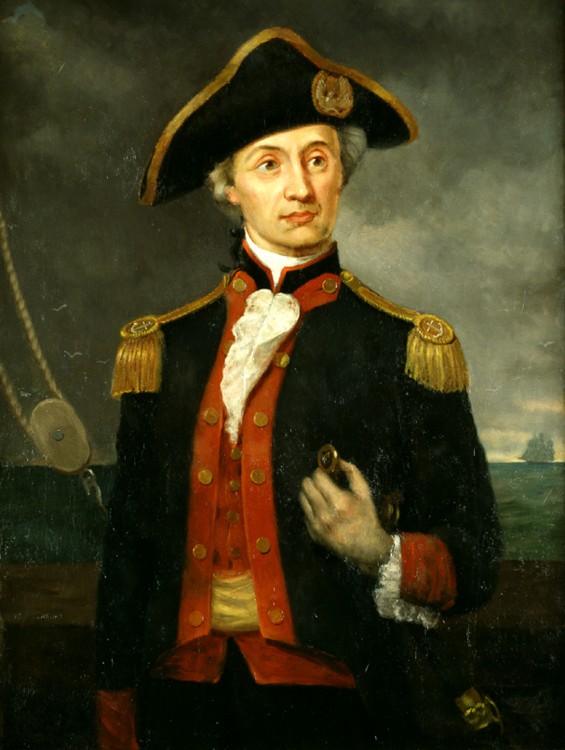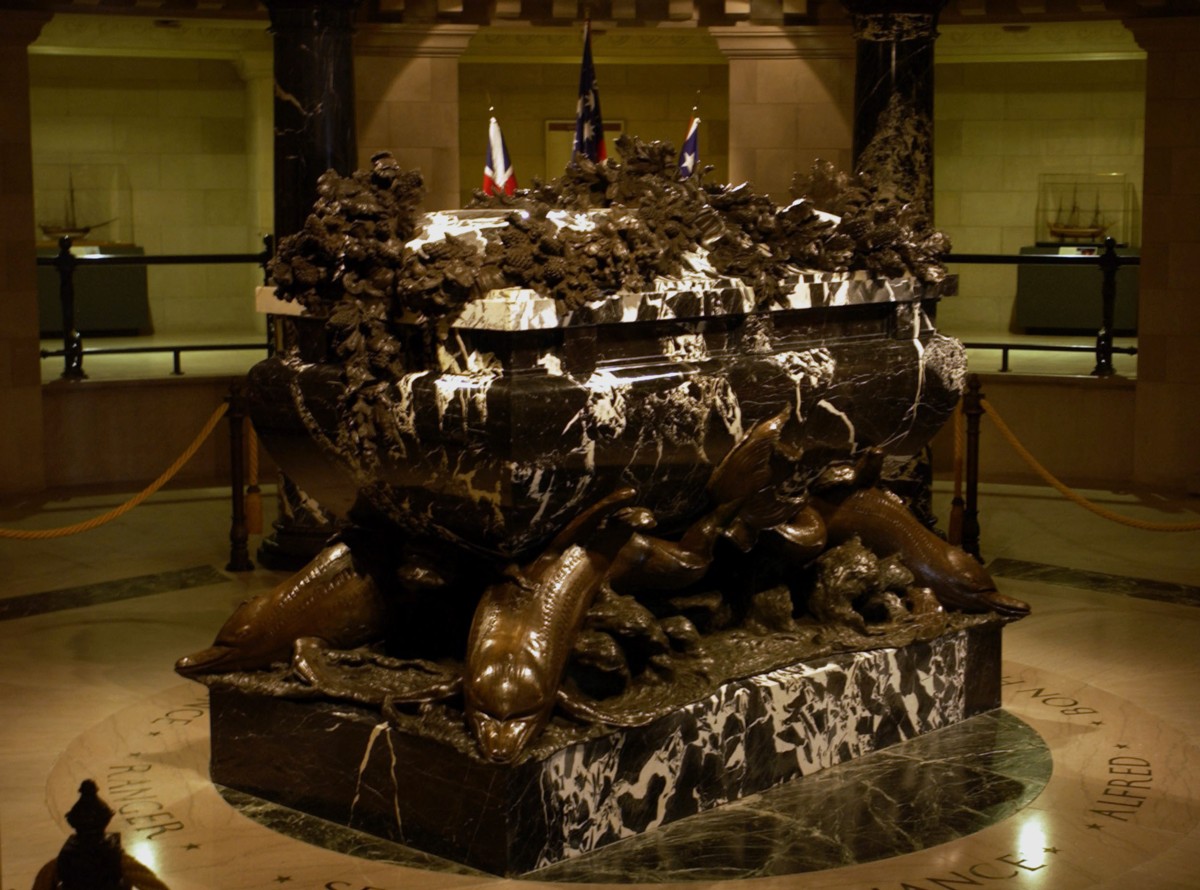|
|
||
|
HOME
|
US Navy -
ships
|
US Navy - air
units
|
USMC - air
units
|
International
Navies
|
Weapon Systems
|
Special Reports |
||
|
US Navy - Guided Missile Destroyer DDG 53 - USS John Paul Jones |
||
|
||
| 02/20 | ||
|
Type,
class: Guided Missile Destroyer - DDG; Arleigh Burke
class, Flight I Builder: Bath Iron Works, Bath, Maine, USA STATUS: Awarded: September 25, 1987 Laid down: August 8, 1990 Launched: October 26, 1991 Commissioned: December 18, 1993 IN SERVICE Homeport: Joint Base Pearl Harbor-Hickam, Hawaii Namesake: Captain John Paul Jones (1747-1792) Ships Motto: IN HARM'S WAY Technical Data: see: INFO > Arleigh Burke class Guided Missile Destroyer - DDG |
||
| images | ||
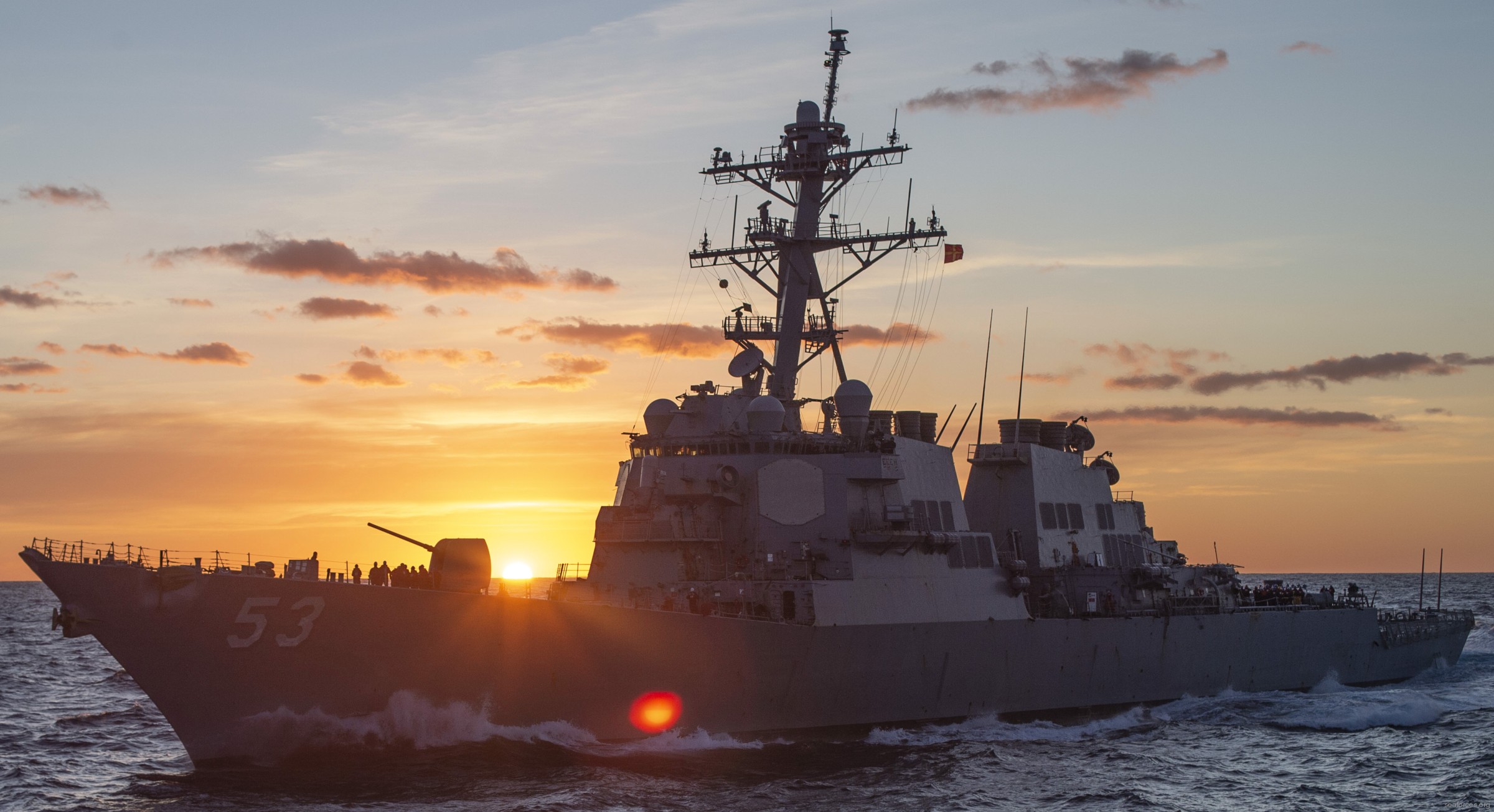 Pacific Ocean - February 2020 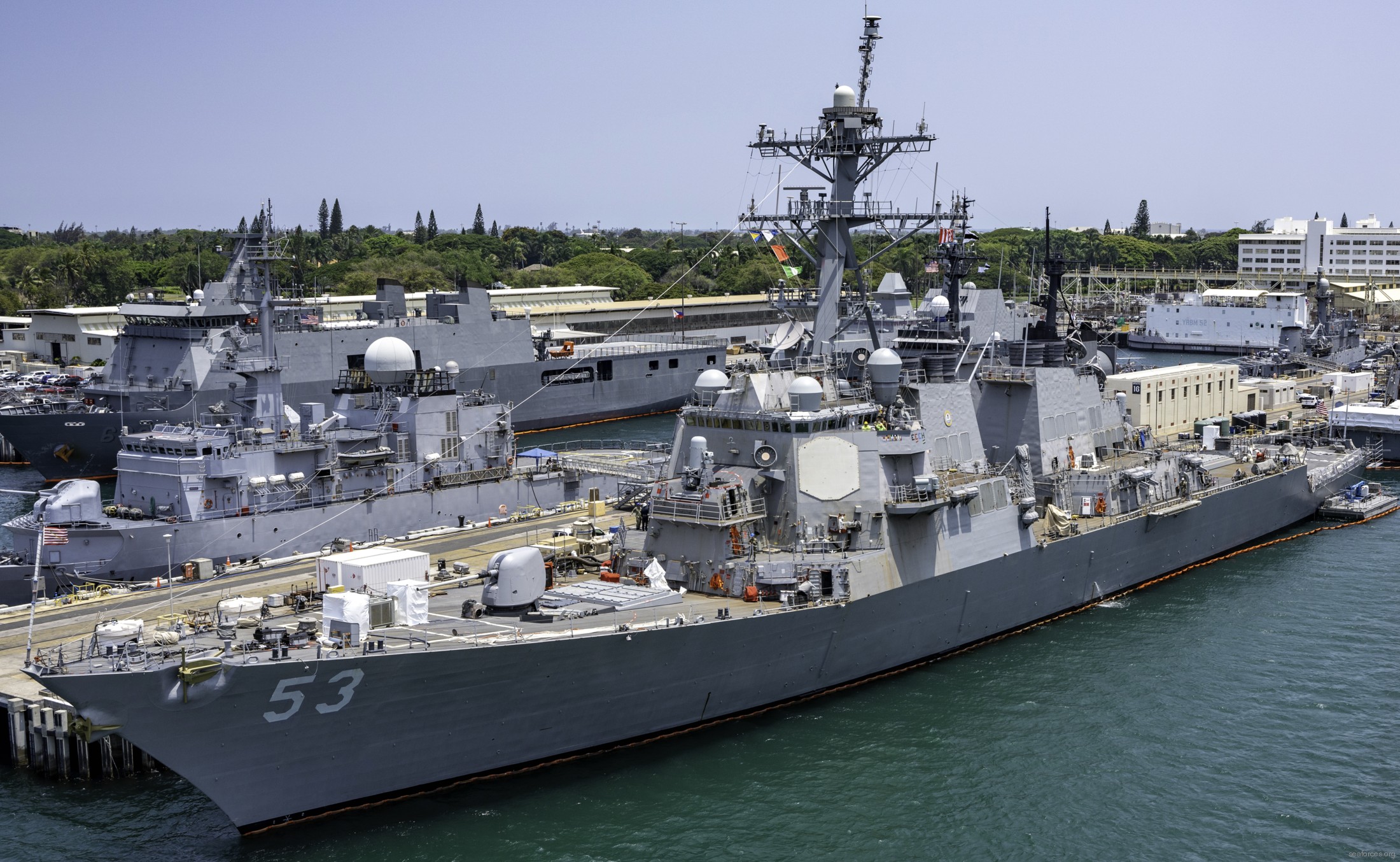 during exercise RIMPAC 18 - Pearl Harbor, Hawaii - July 2018 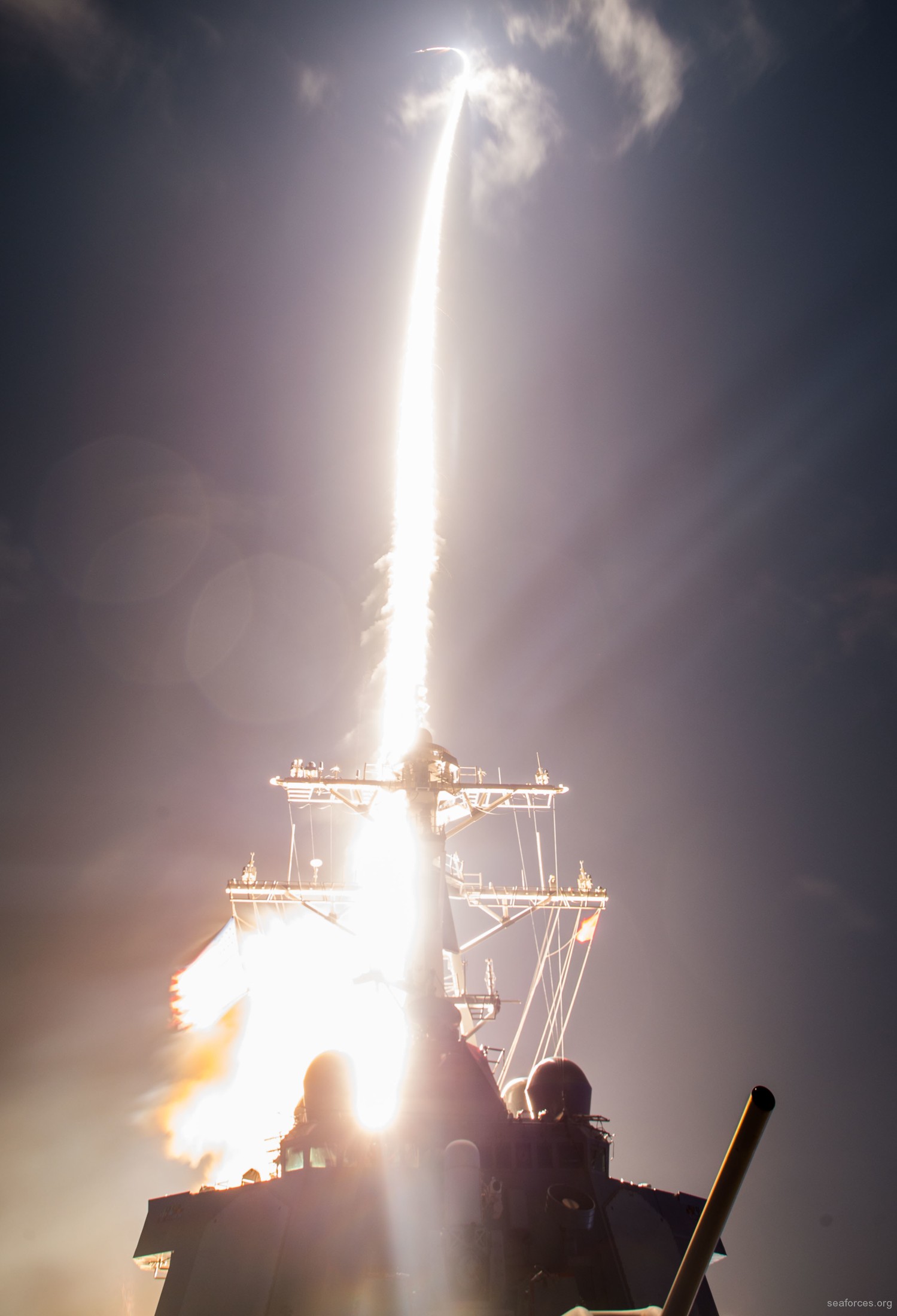 USS John Paul Jones successfully conducted a flight test resulting in the first intercept of a ballistic missile target using the RIM-161 Standard Missile-3 (SM-3) Block IIA off the west coast of Hawaii - February 3, 2017 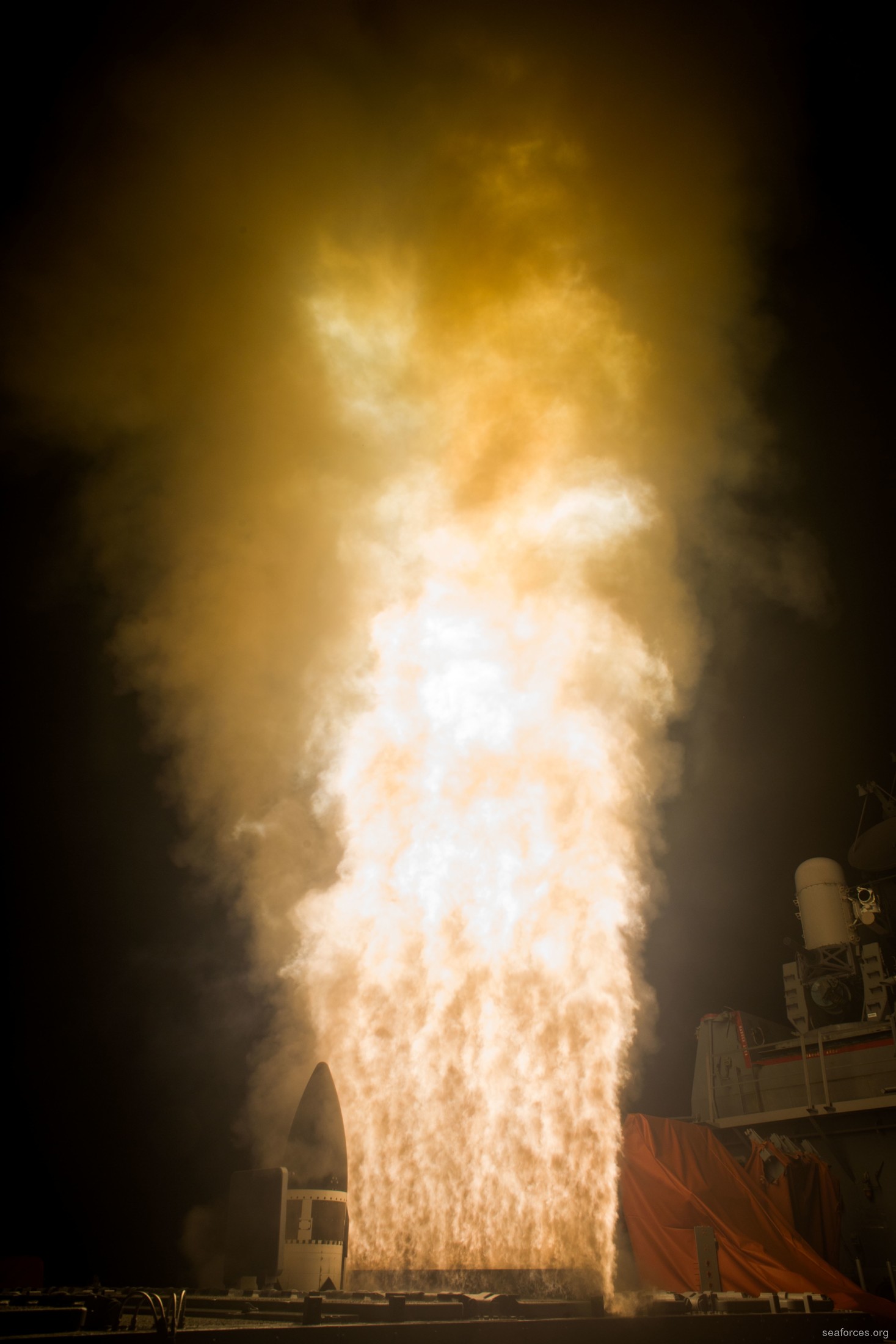 USS John Paul Jones successfully conducted a flight test resulting in the first intercept of a ballistic missile target using the RIM-161 Standard Missile-3 (SM-3) Block IIA off the west coast of Hawaii - February 3, 2017 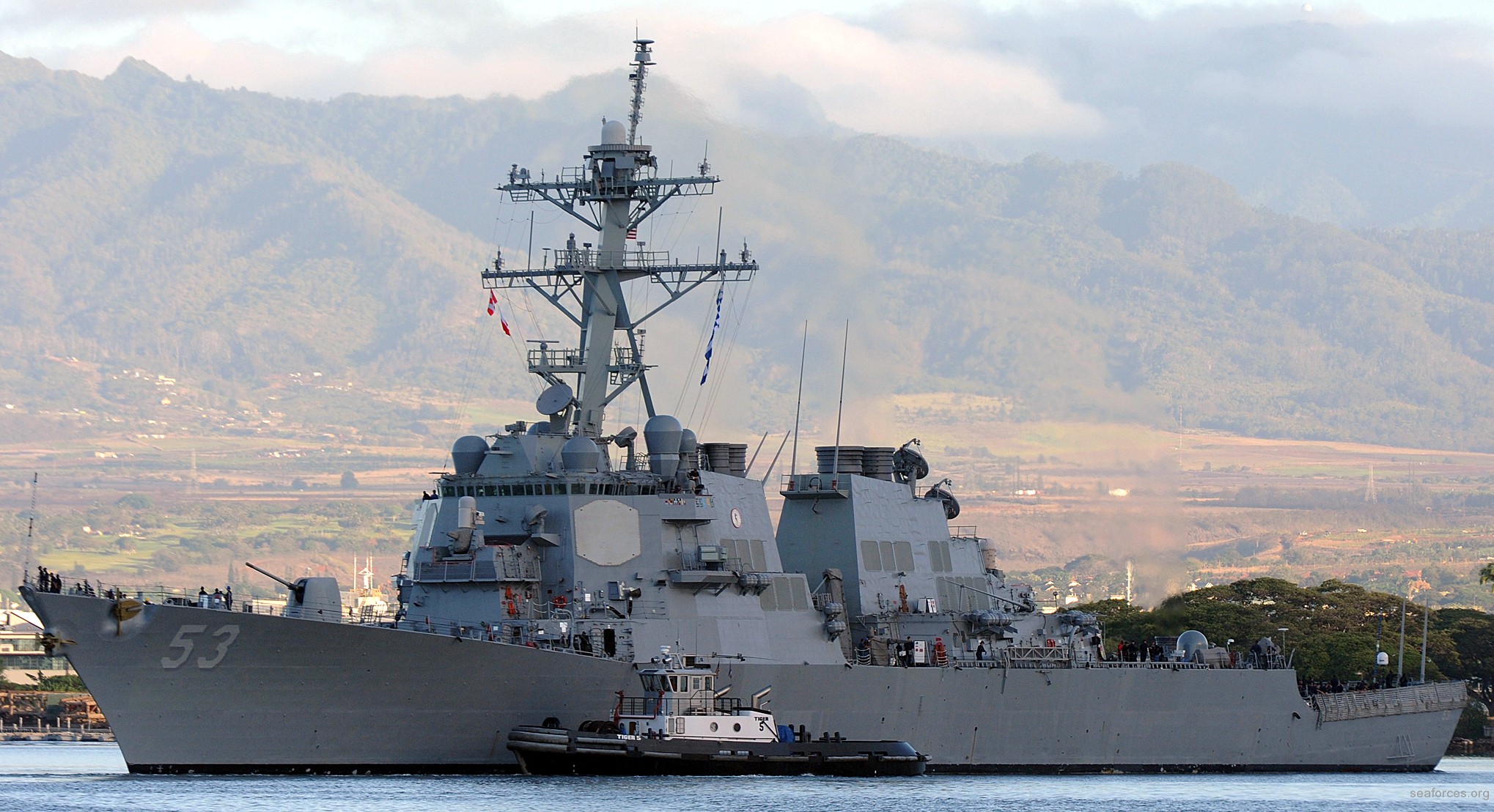 Pearl Harbor, Hawaii - July 2015 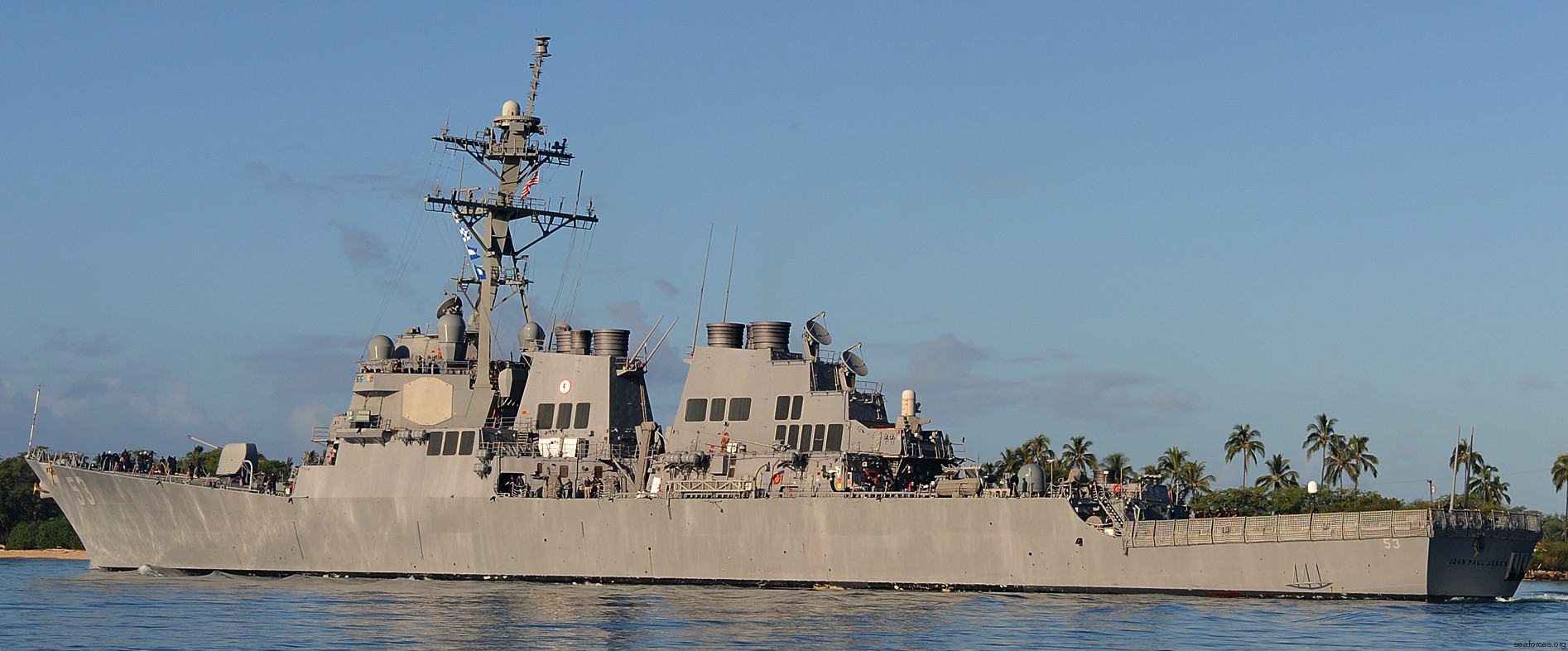 Pearl Harbor, Hawaii - July 2015 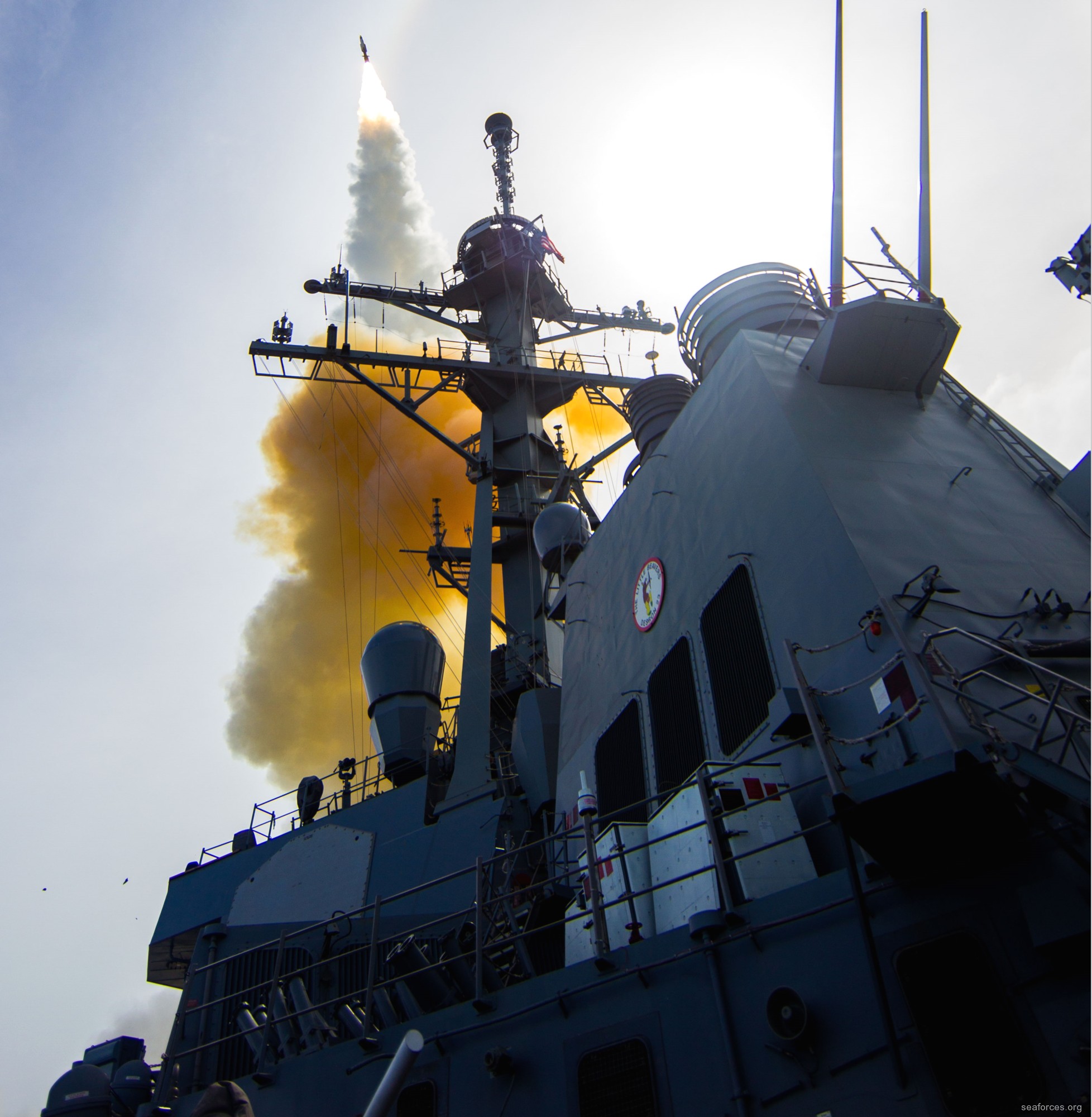 USS John Paul Jones (DDG 53) conducts a flight test from the Pacific Missile Range Facility on Kauai, Hawaii, of the Aegis Ballistic Missile Defense System - November 2014 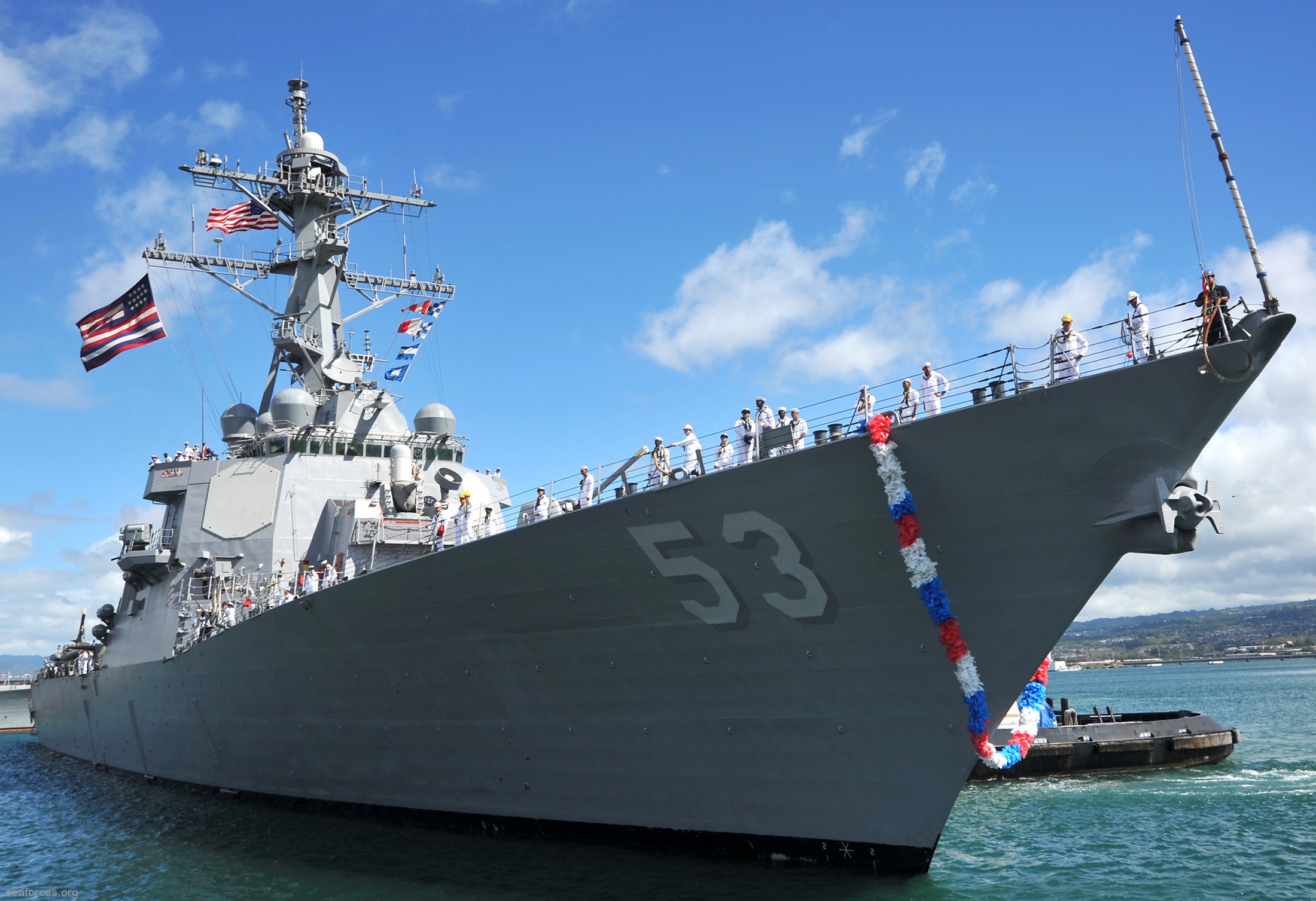 USS John Paul Jones (DDG 53) prepares to moor at her new homeport, Joint Base Pearl Harbor-Hickam, following a homeport swap with the guided-missile cruiser USS Lake Erie (CG 70) - August 2014 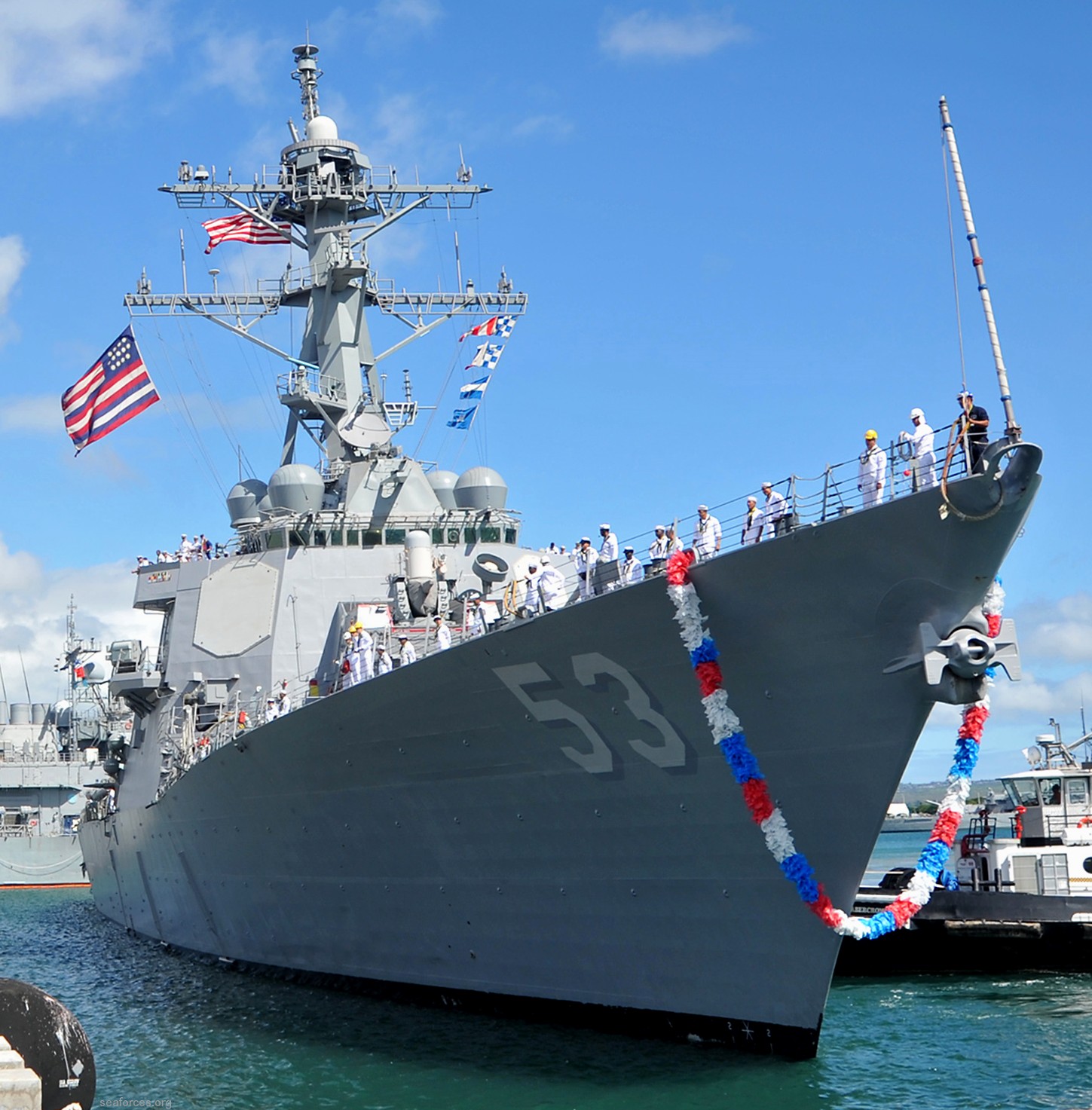 Joint Base Pearl Harbor-Hickam, Hawaii - August 2014 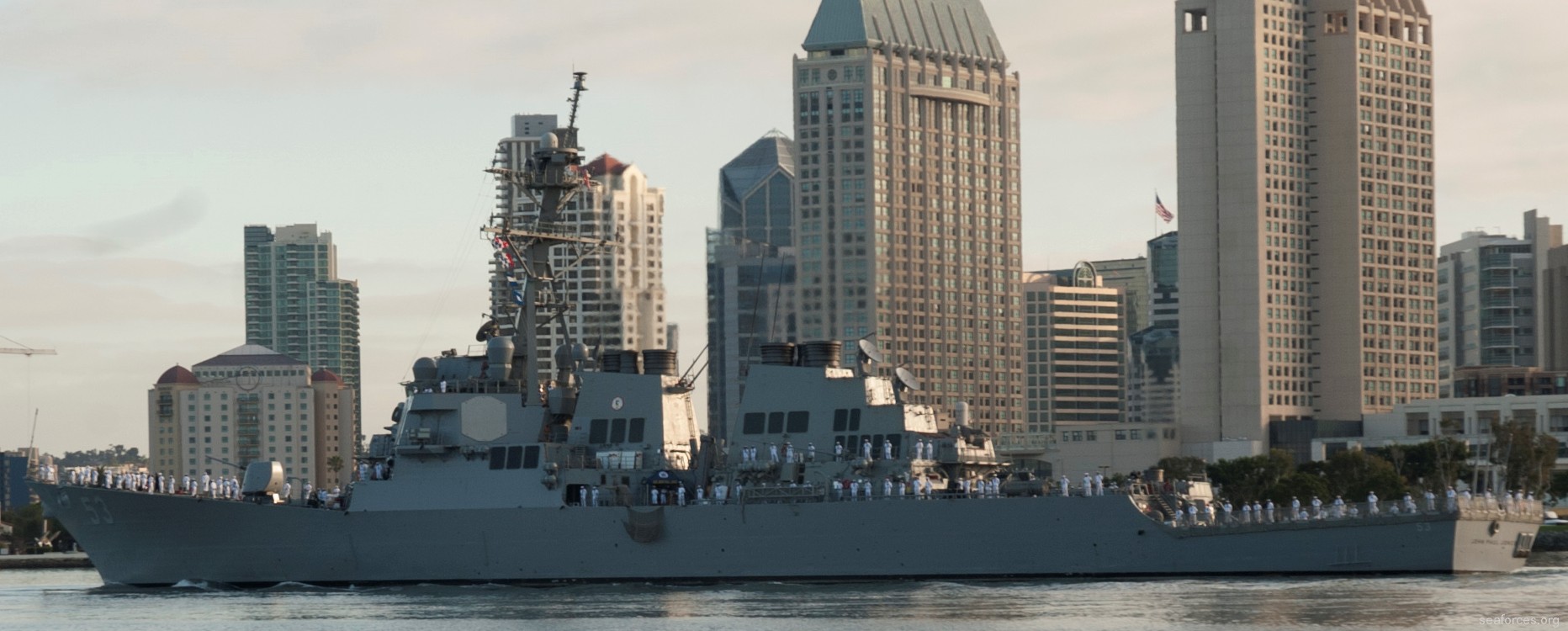 USS John Paul Jones (DDG 53) departs San Diego en route to its new homeport in Pearl Harbor, Hawaii - August 2014 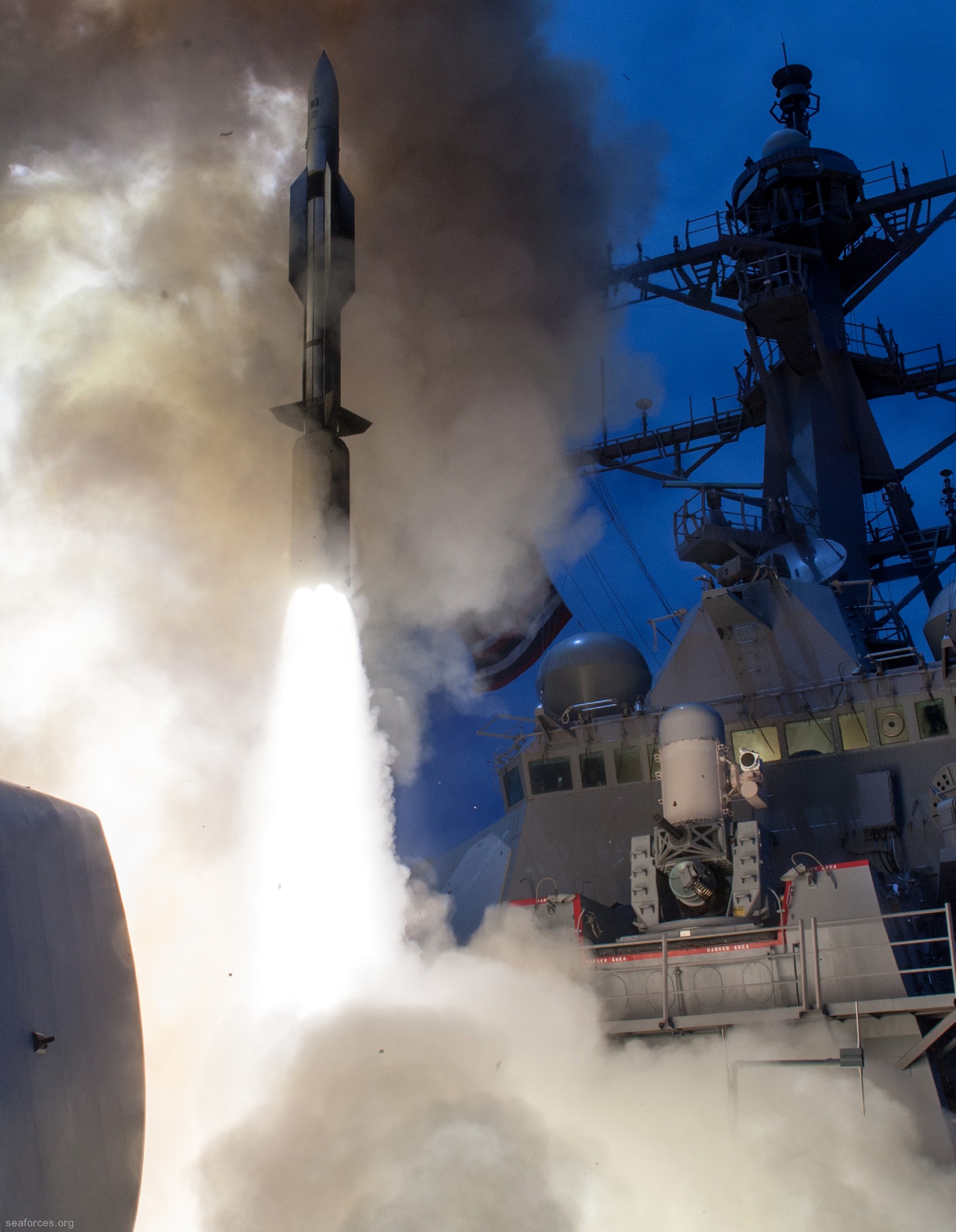 USS John Paul Jones (DDG 53) launches a RIM-174 Standard Missile-6 (SM-6 ERAM) during a live-fire test of the ship's AEGIS weapons system. Over the course of three days, the crew of John Paul Jones successfully engaged six targets, firing a total of five missiles that included four SM-6 models and one RIM-66 Standard Missile-2 (SM-2MR) - Pacific Ocean - June 2014 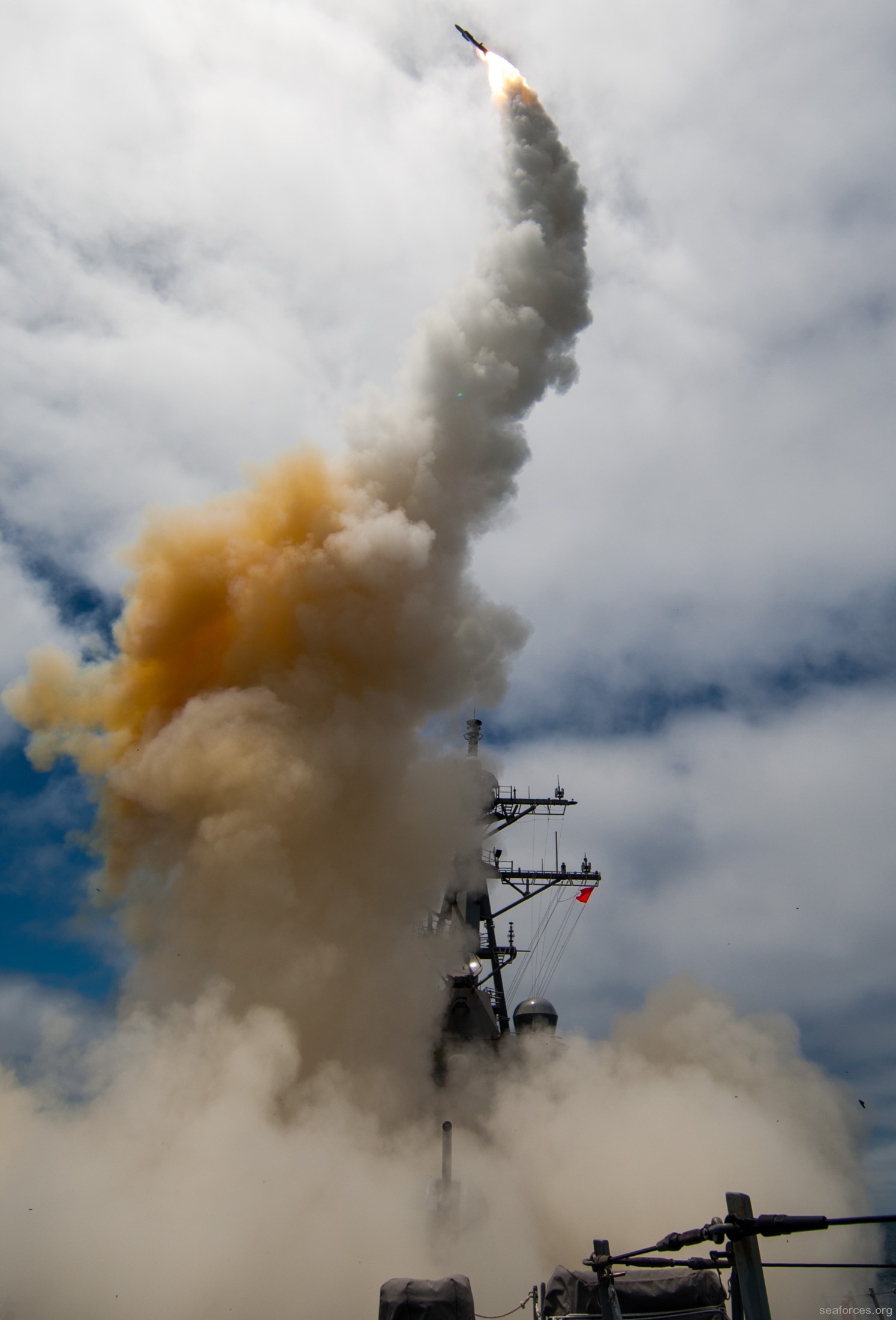 launching a RIM-174 Standard Missile-6 (SM-6 ERAM) - June 2014 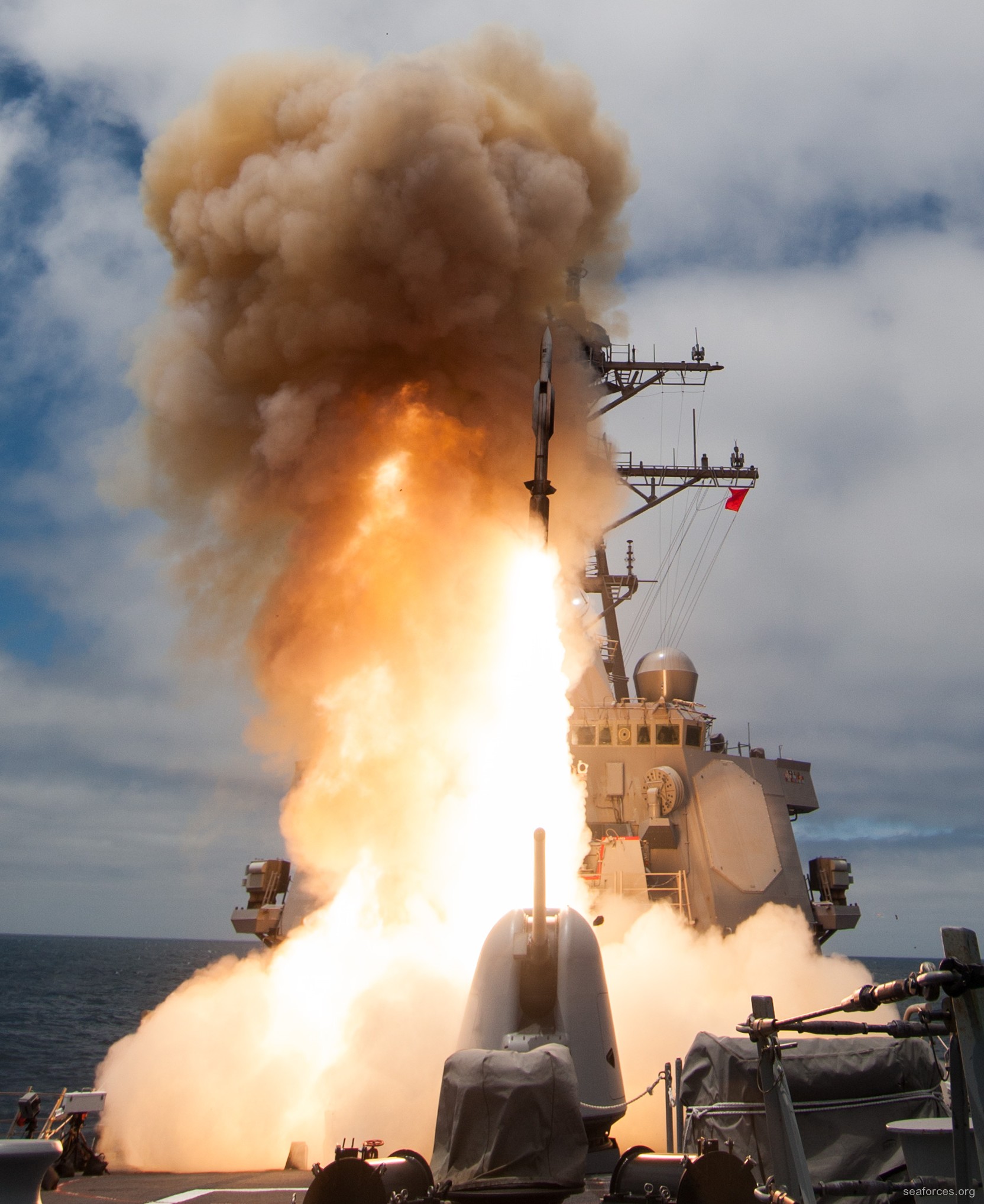 launching a RIM-174 Standard Missile-6 (SM-6 ERAM) - June 2014 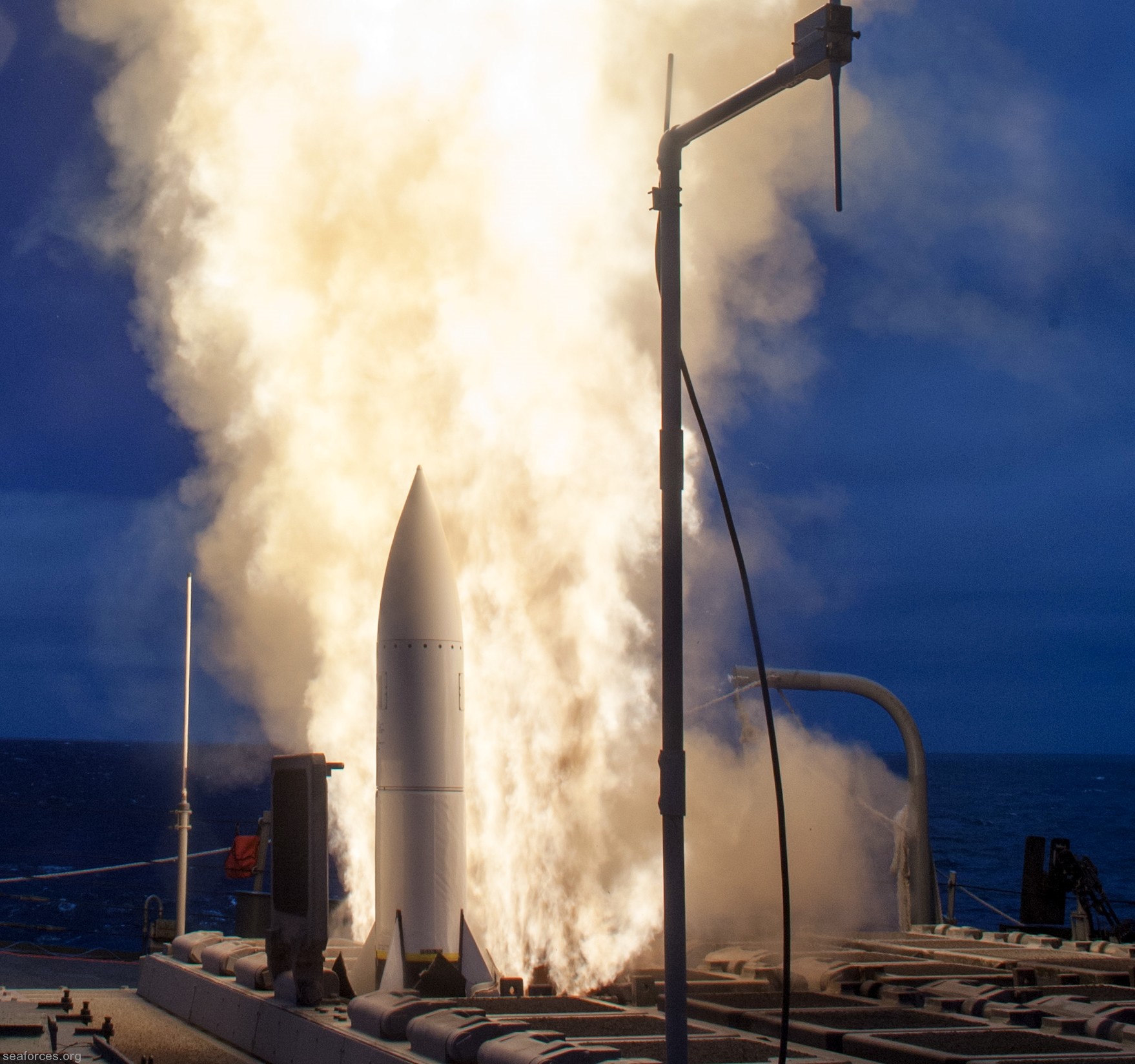 launching a RIM-174 Standard Extended Range Active Missile-6 (SM-6 ERAM) - June 2014 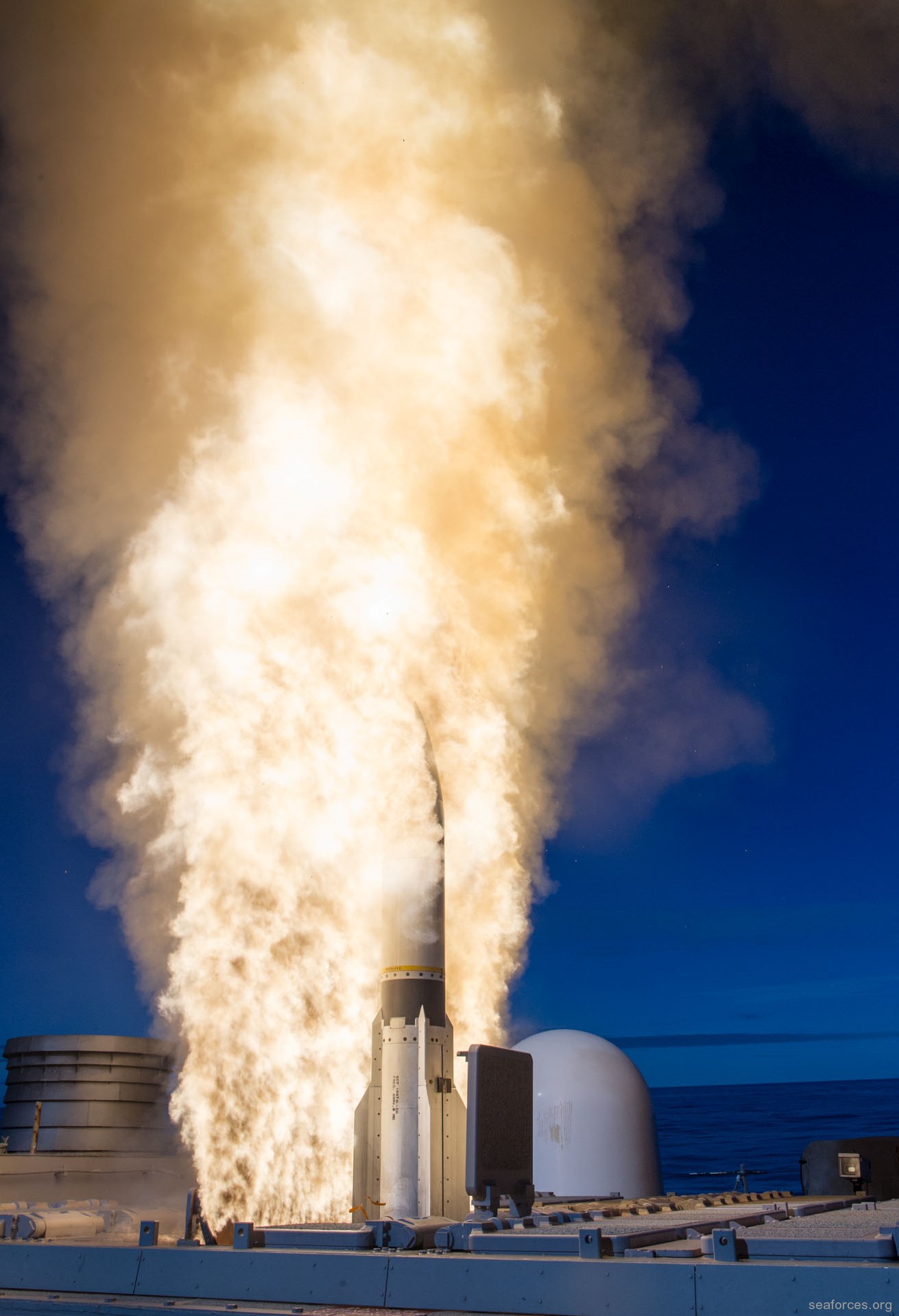 USS John Paul Jones (DDG 53) launches a RIM-66 Standard Missile 2 (SM-2MR) during a live-fire test of the ship's aegis weapons system. John Paul Jones, equipped with the latest-generation Aegis Baseline 9C weapon system, developed a fire control solution and launched the SM-2, which resulted in the successful destruction of two AQM-37C targets - February 2014 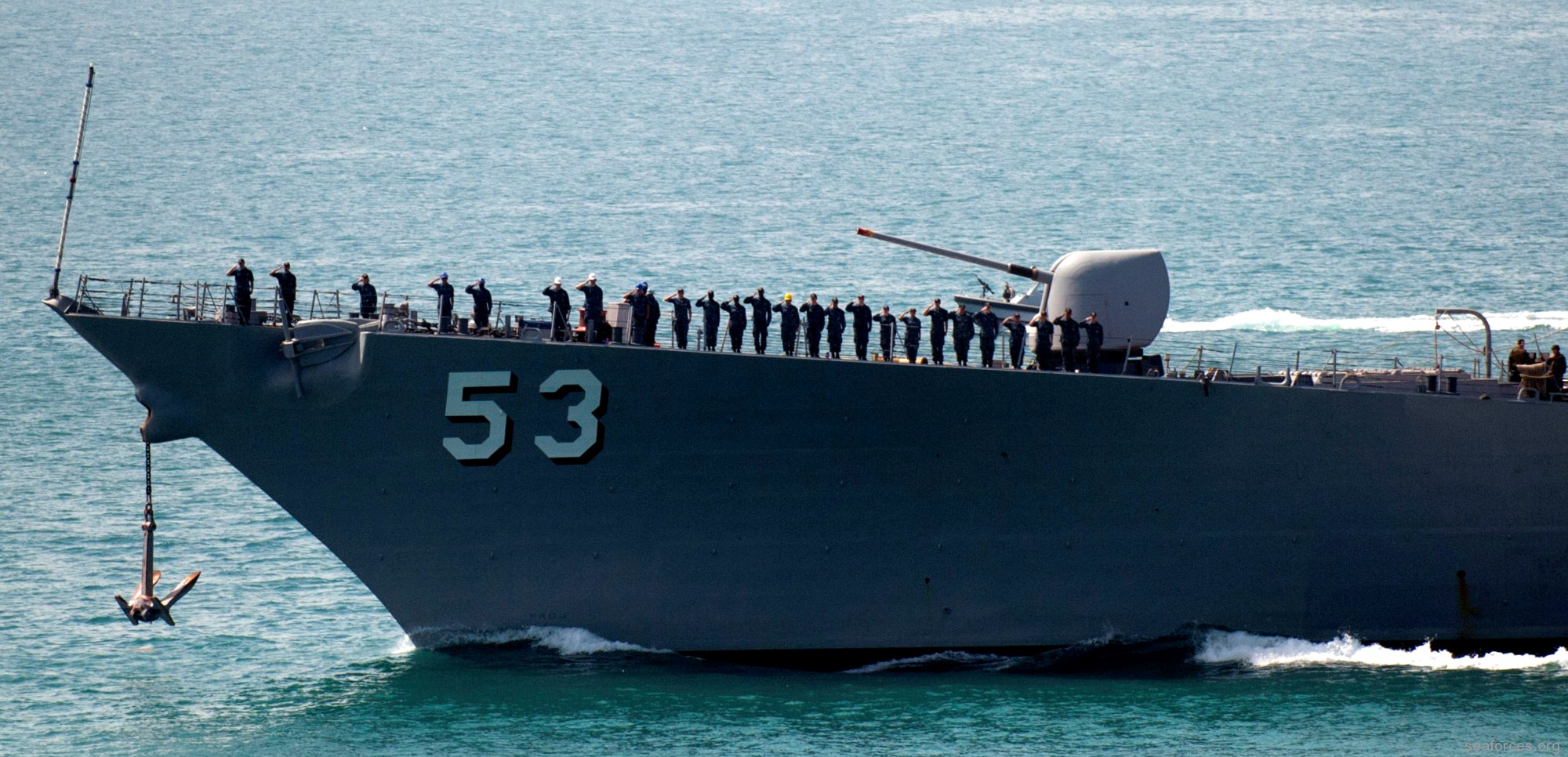 Manama, Bahrain - April 2012 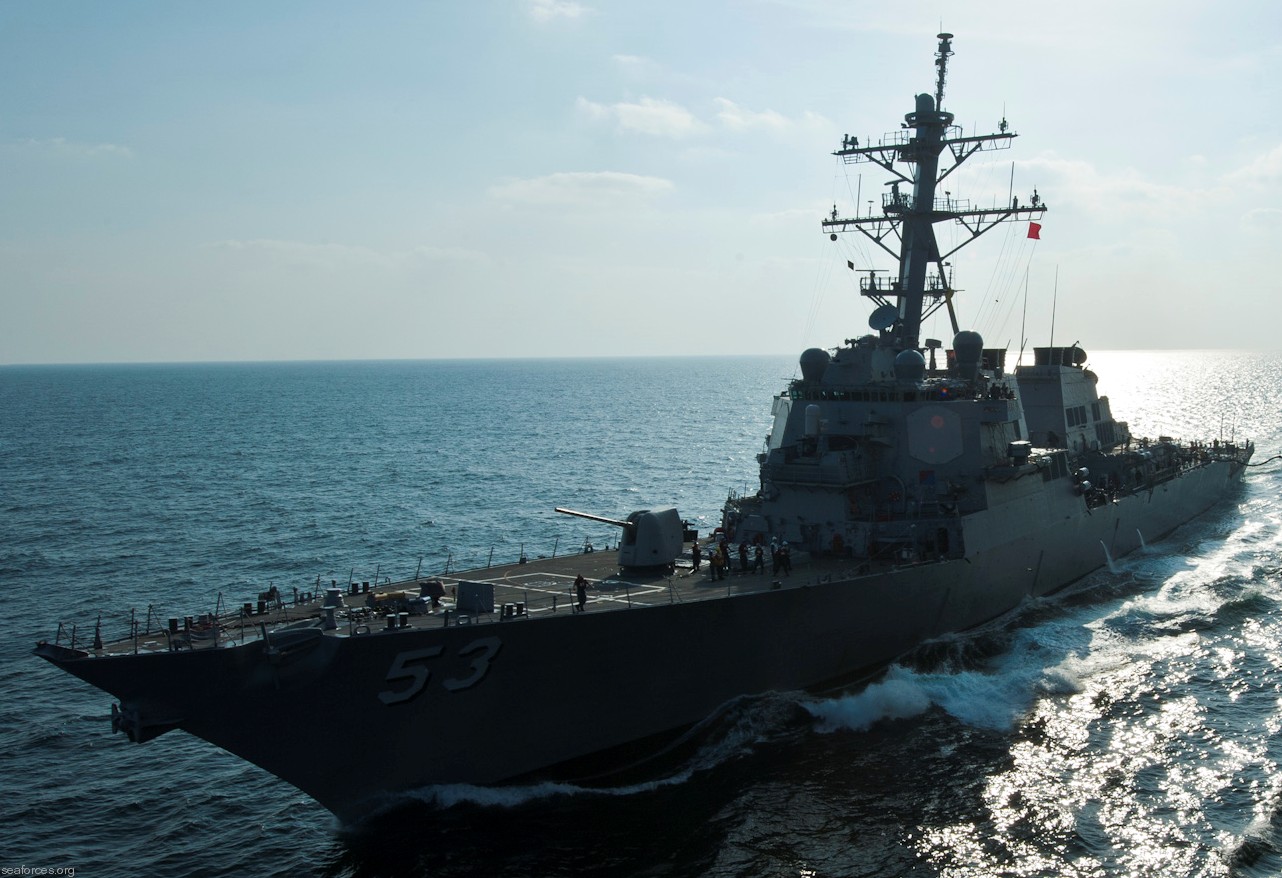 Arabian Sea - January 2012 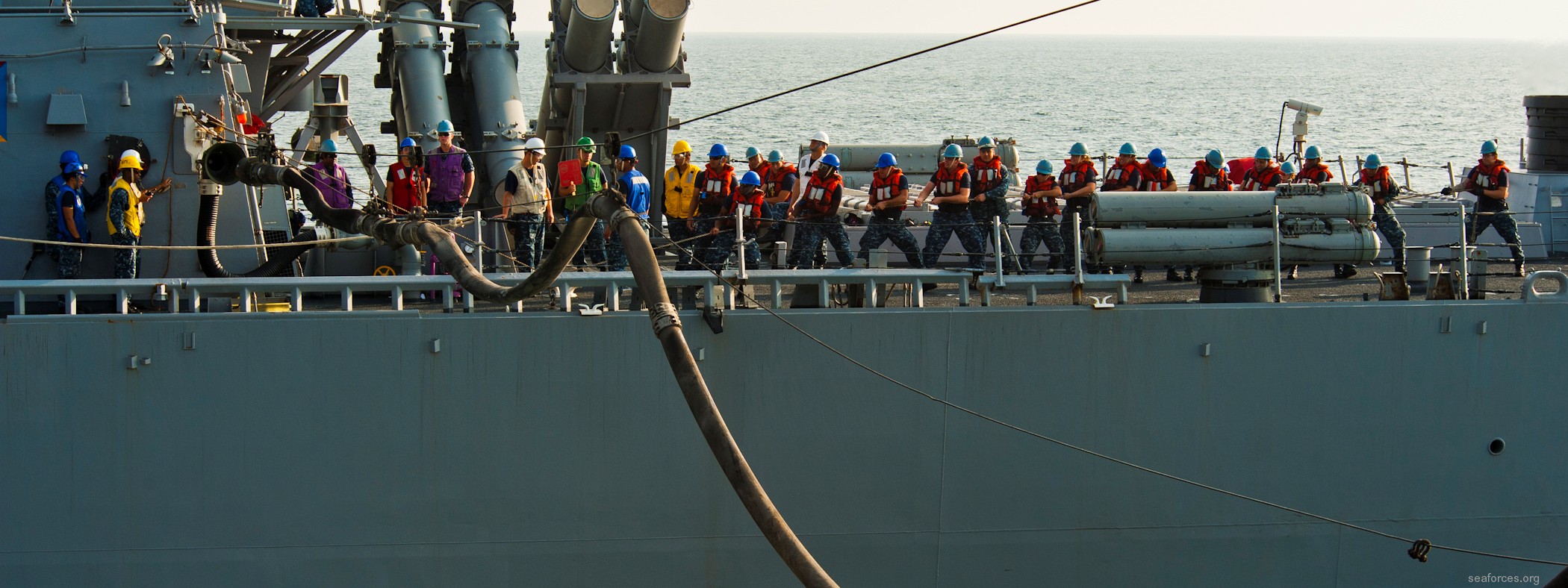 replenishment at sea (RAS) - Arabian Sea - January 2012 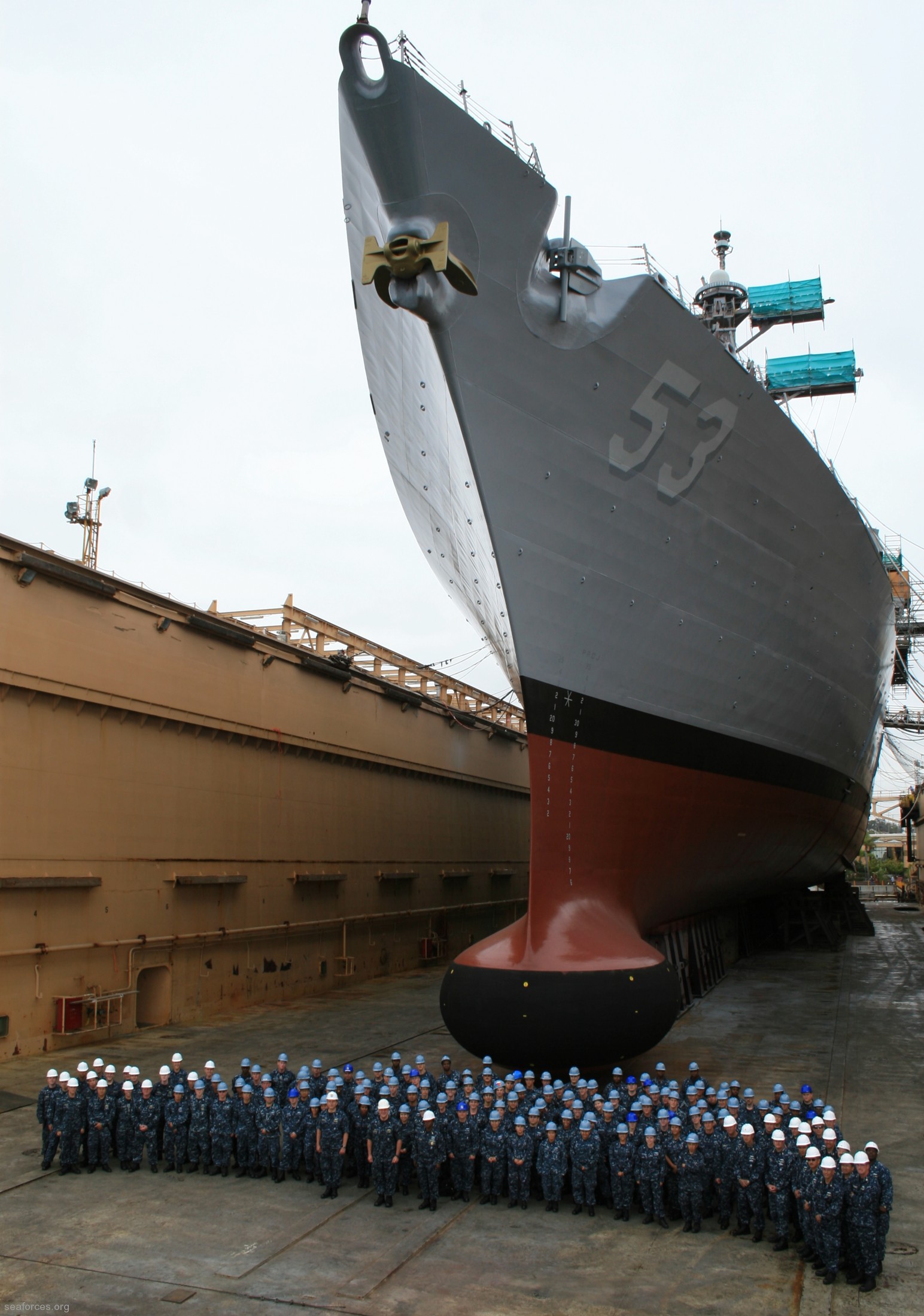 Sailors assigned to the guided-missile destroyer USS John Paul Jones (DDG 53) stand in front of the ship during its last day in dry dock. DDG-53 was the first destroyer to undergo modernization, receiving the hull mechanical & electrical portions of the upgrade - San Diego - September 2010 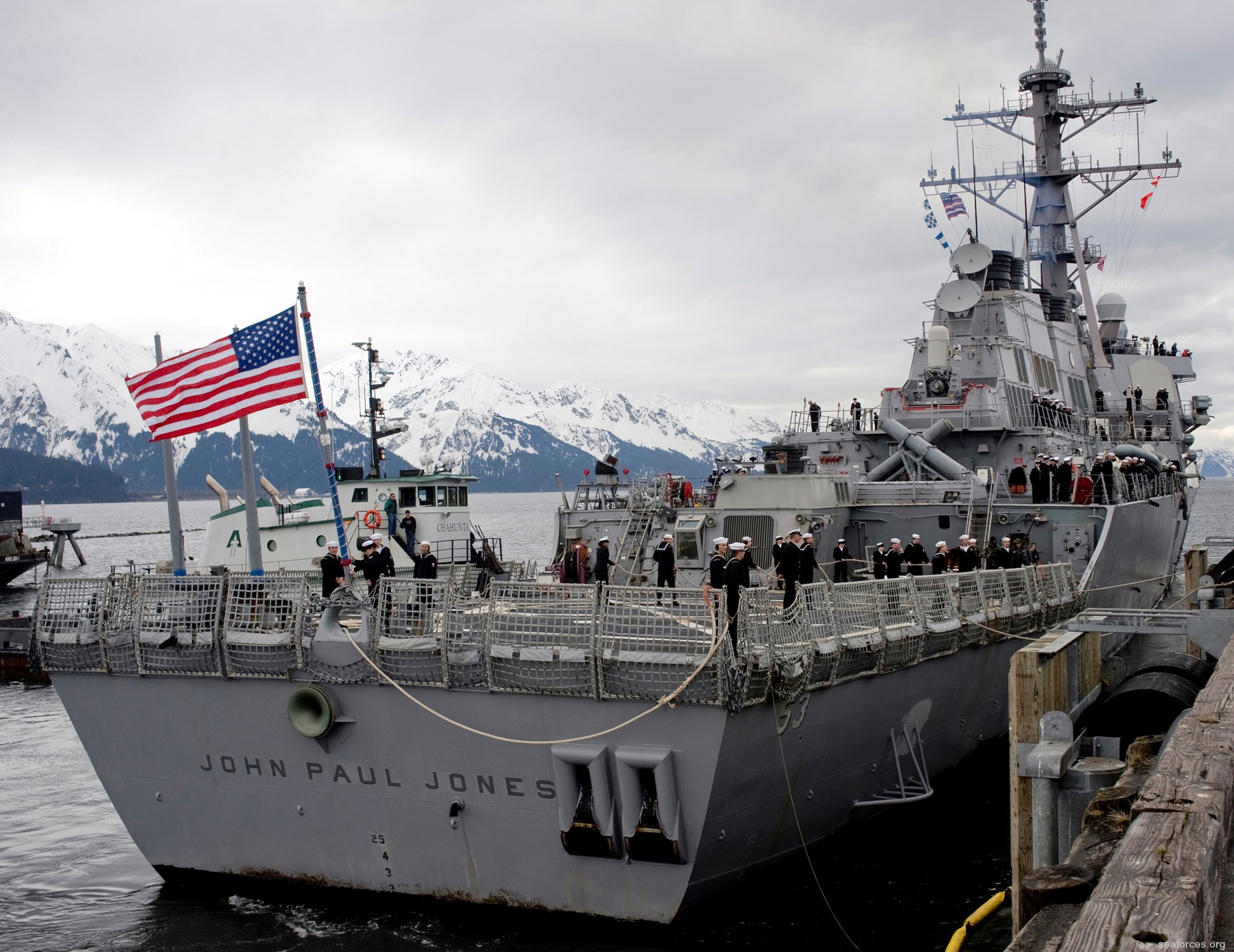 Seward, Alaska - May 2008 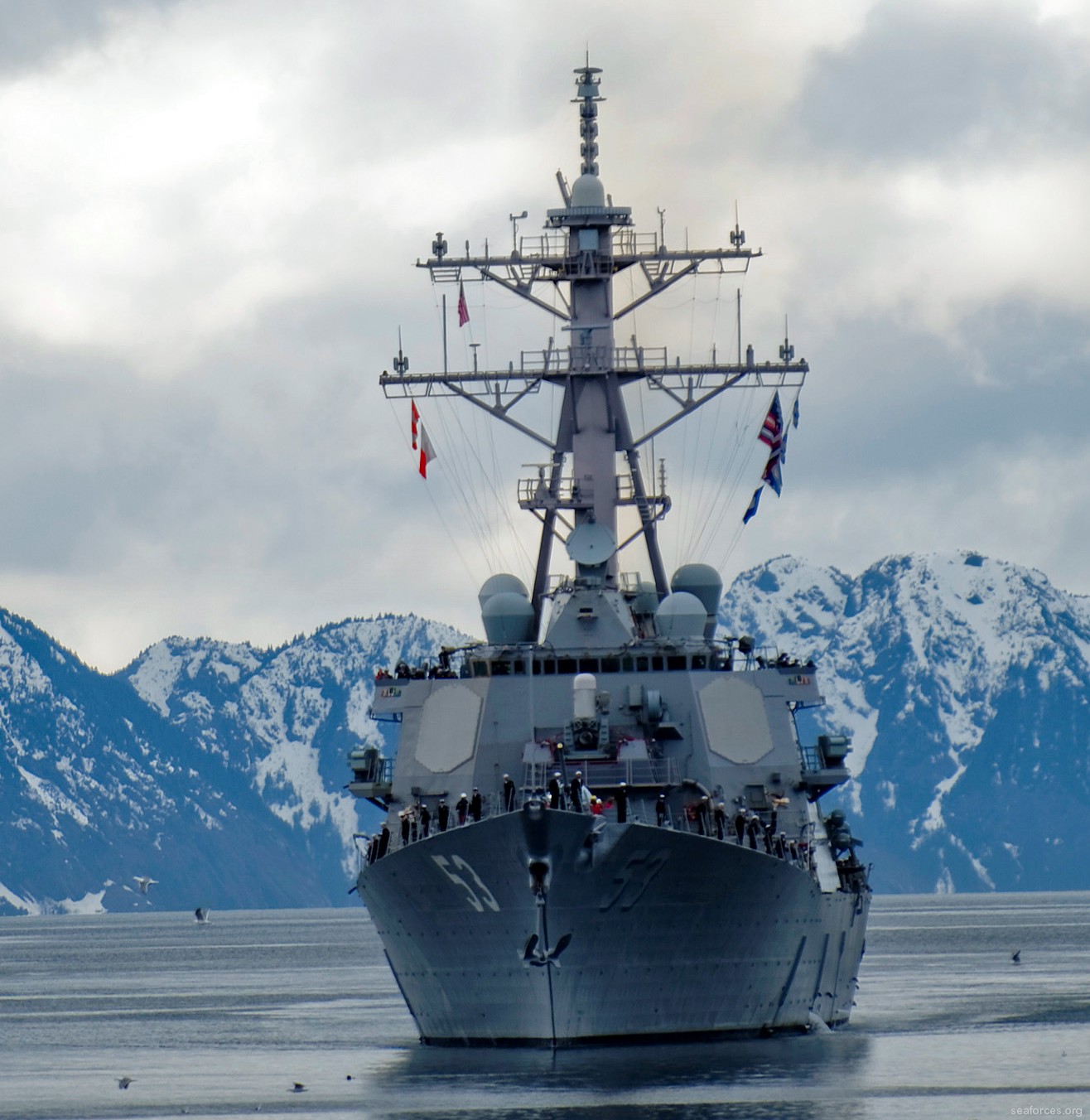 Seward, Alaska - May 2008 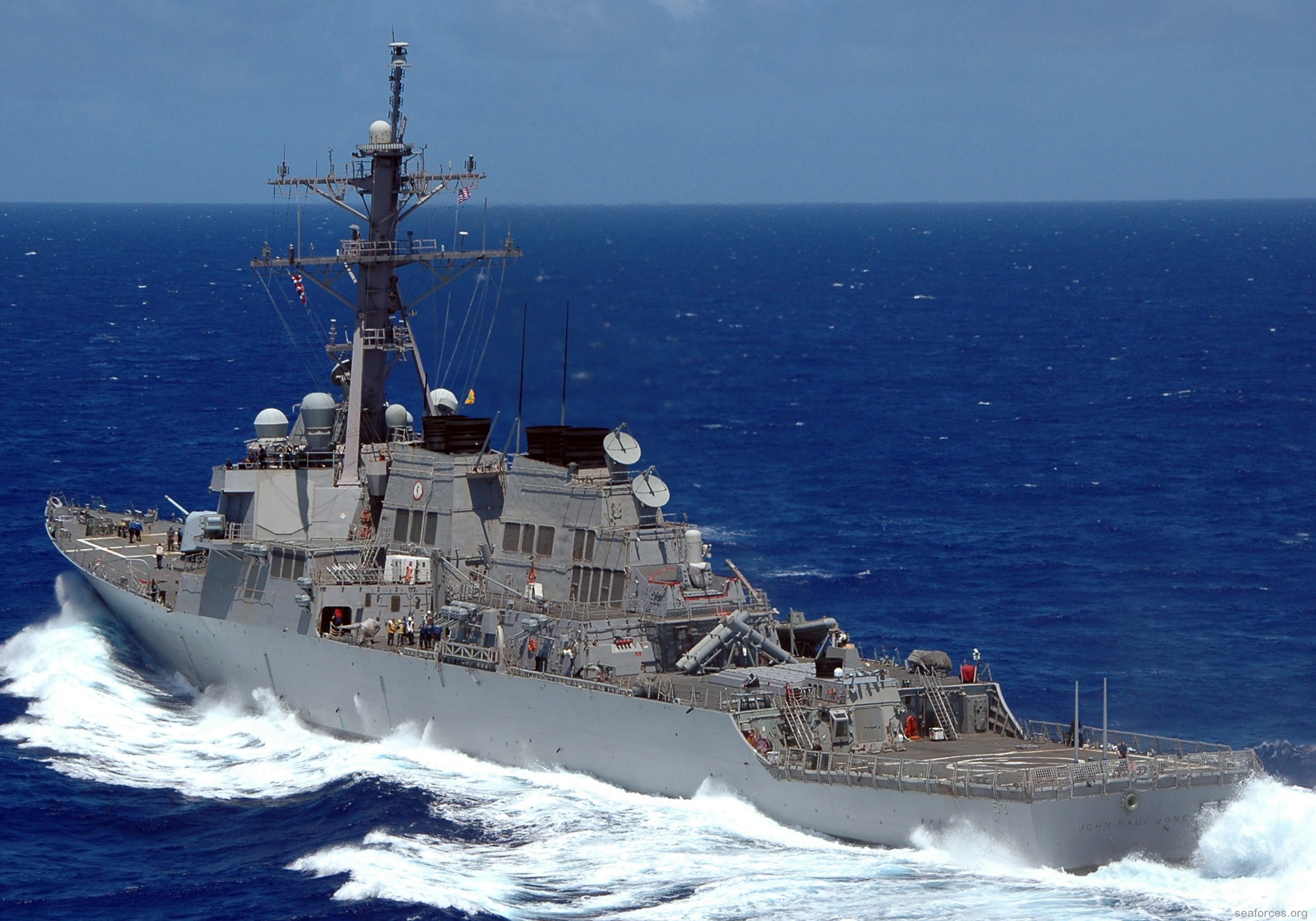 Pacific Ocean - April 2008 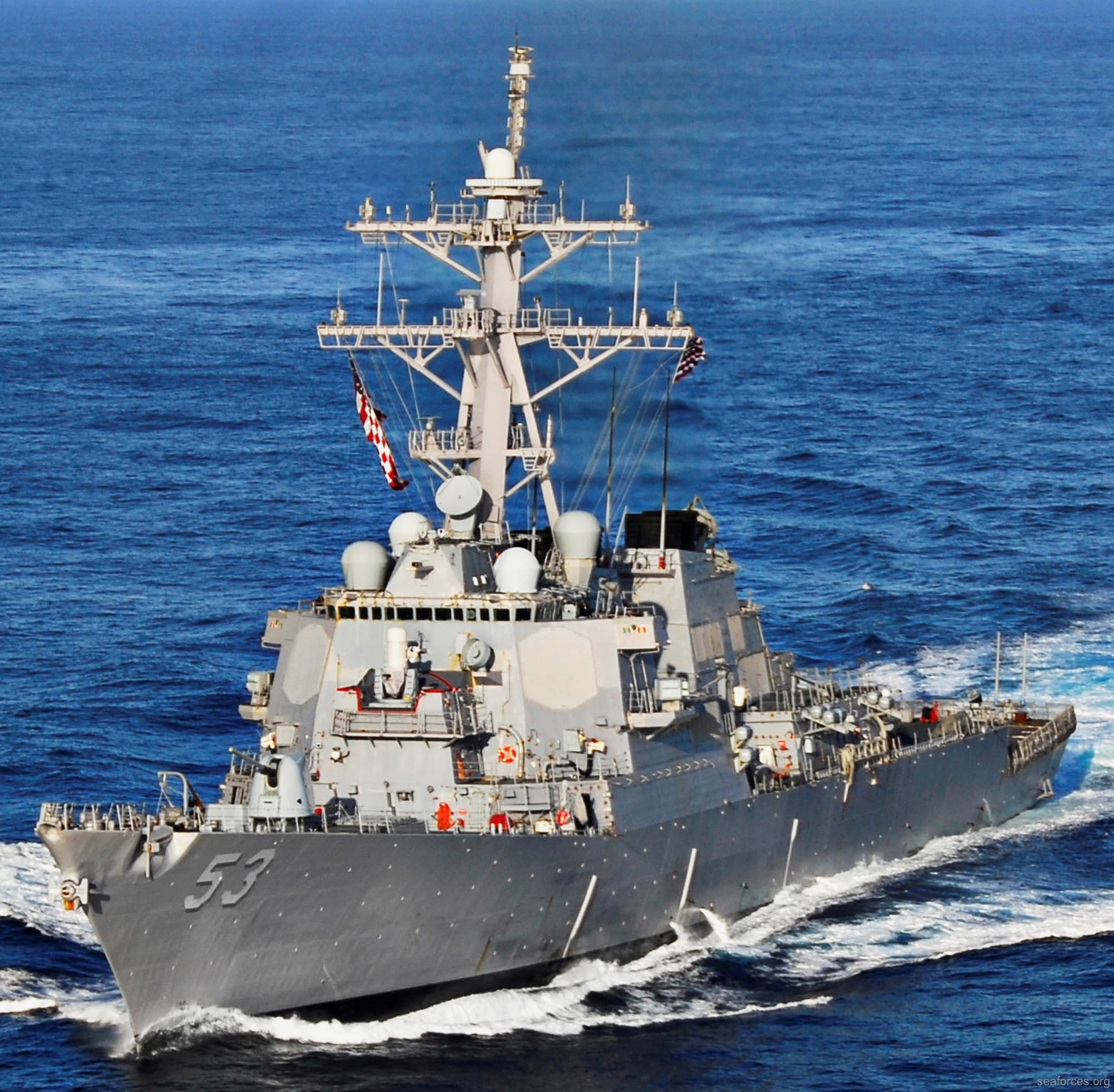 East China Sea - March 2008 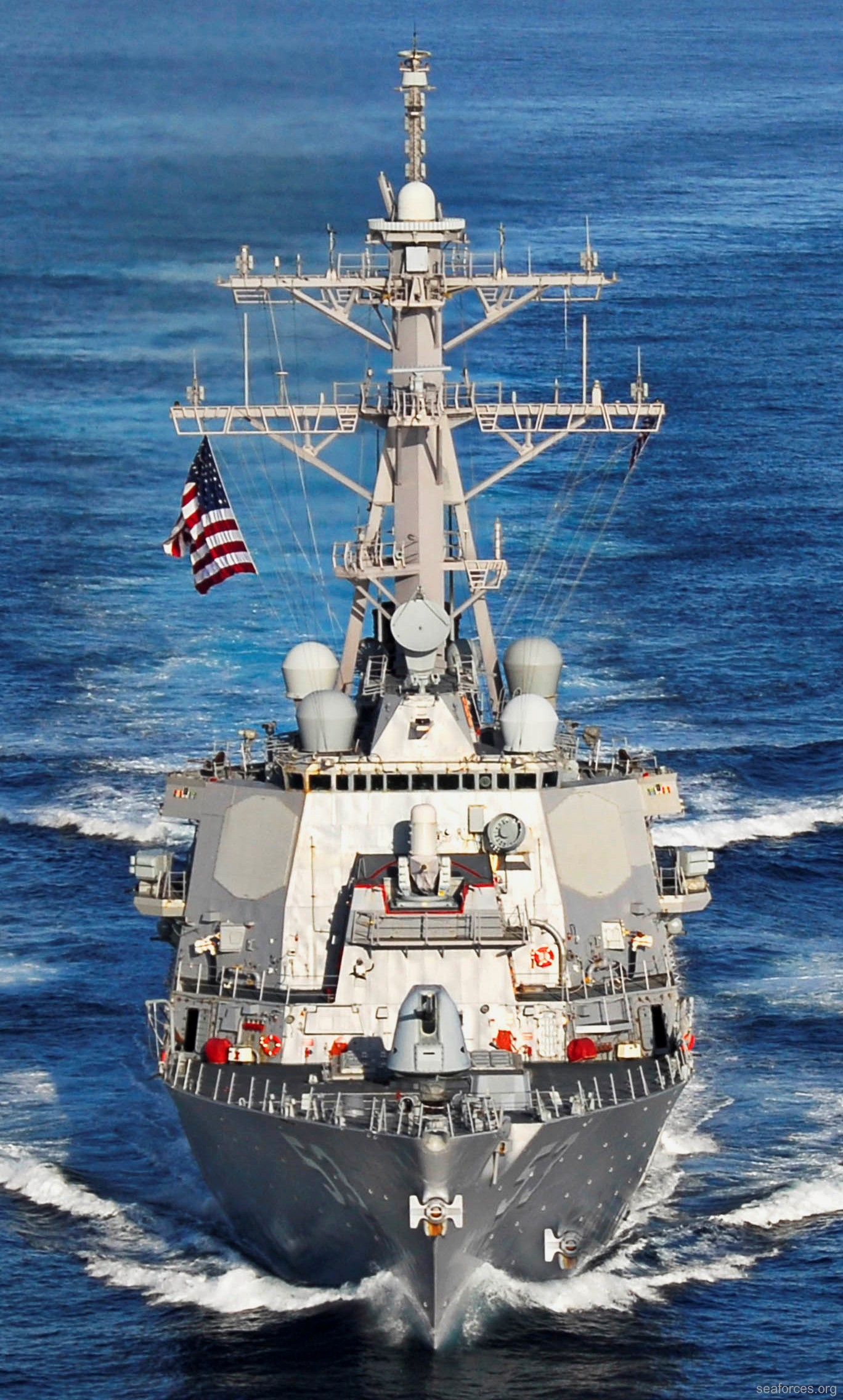 East China Sea - March 2008 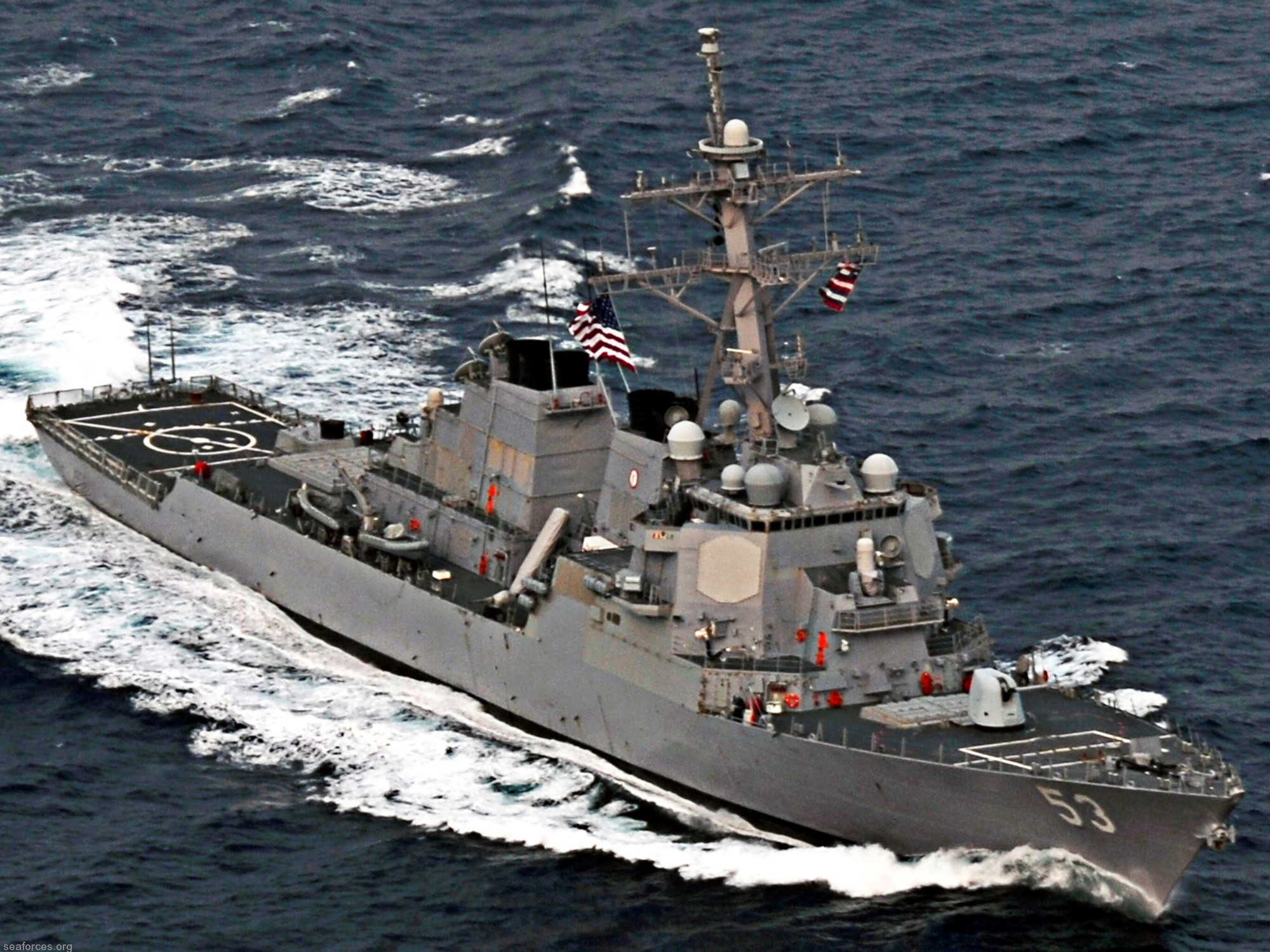 Pacific Ocean - March 2008 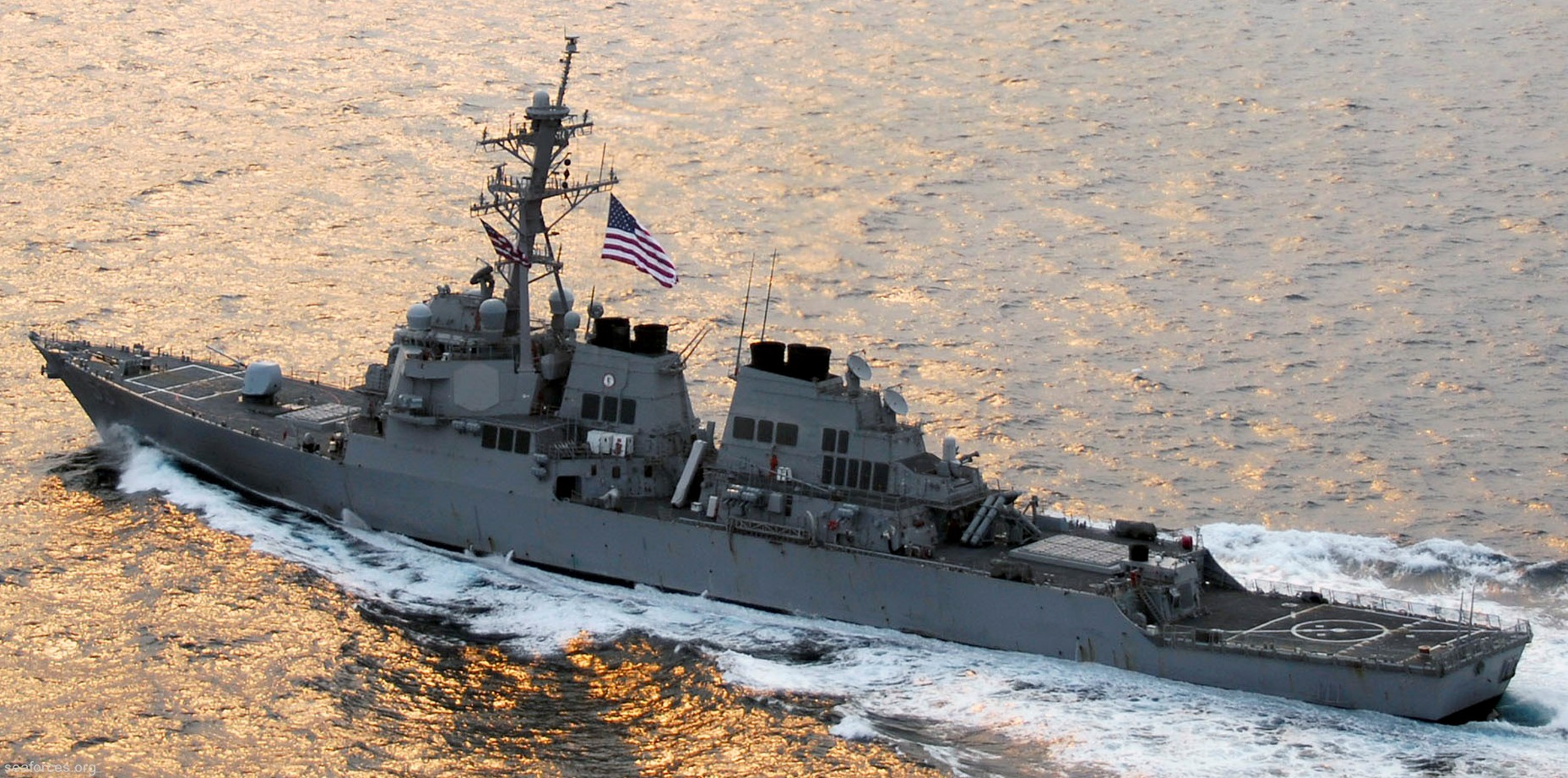 Pacific Ocean - March 2008 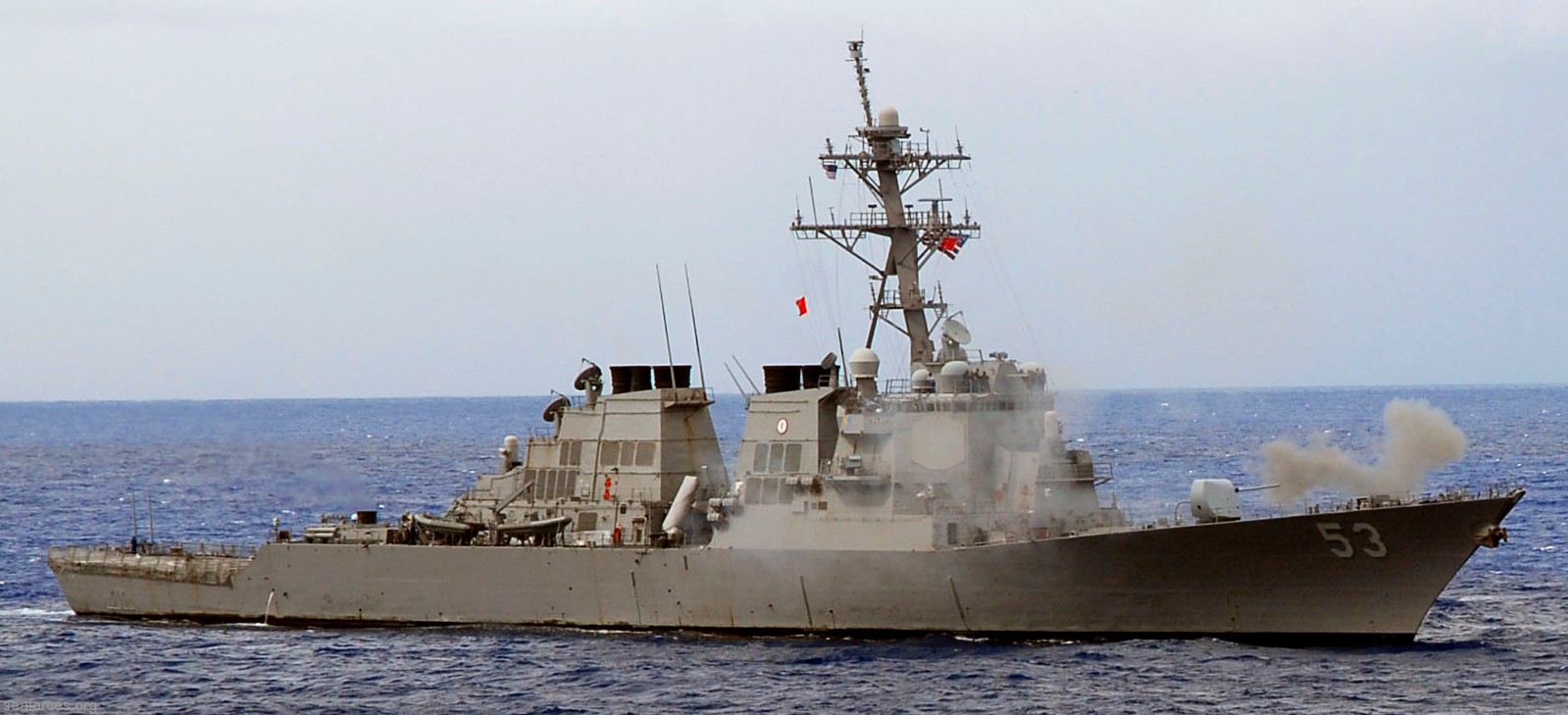 Pacific Ocean - September 2007 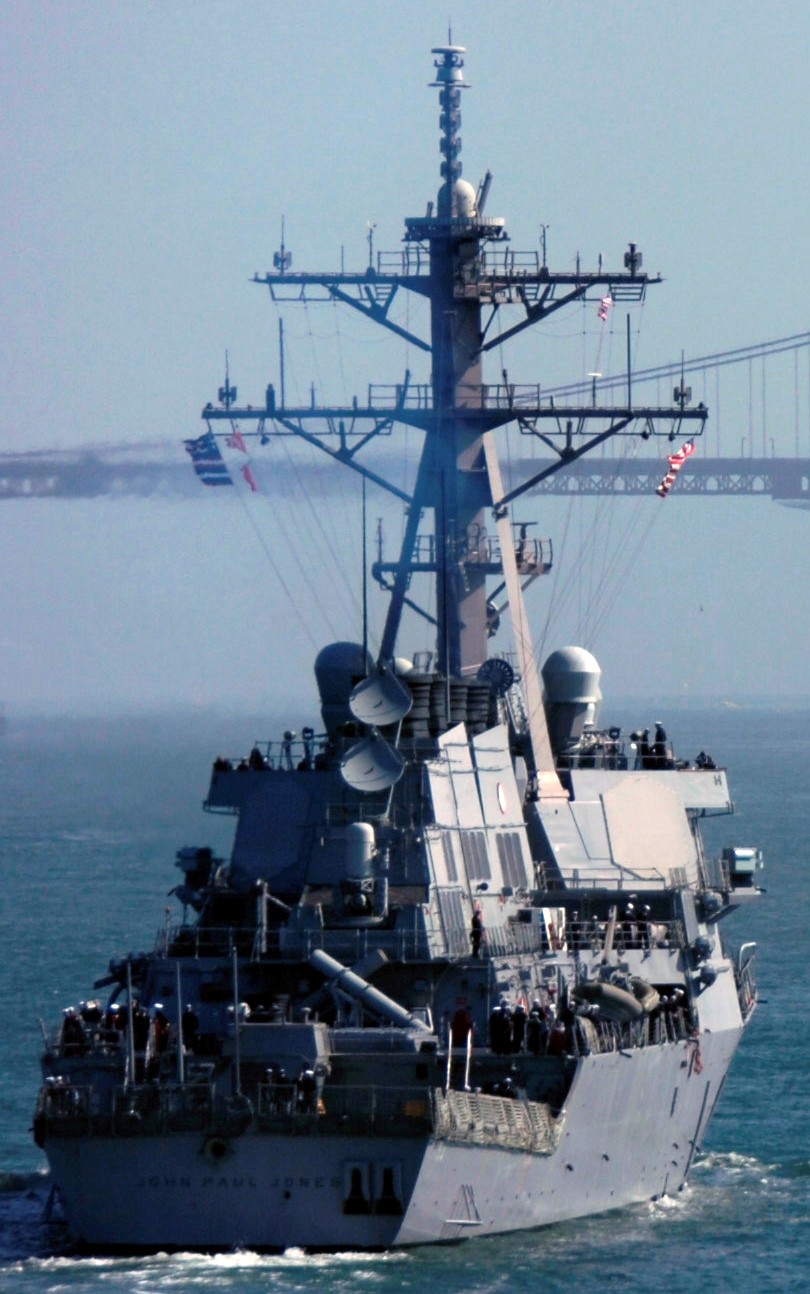 San Francisco Fleet Week - October 2006 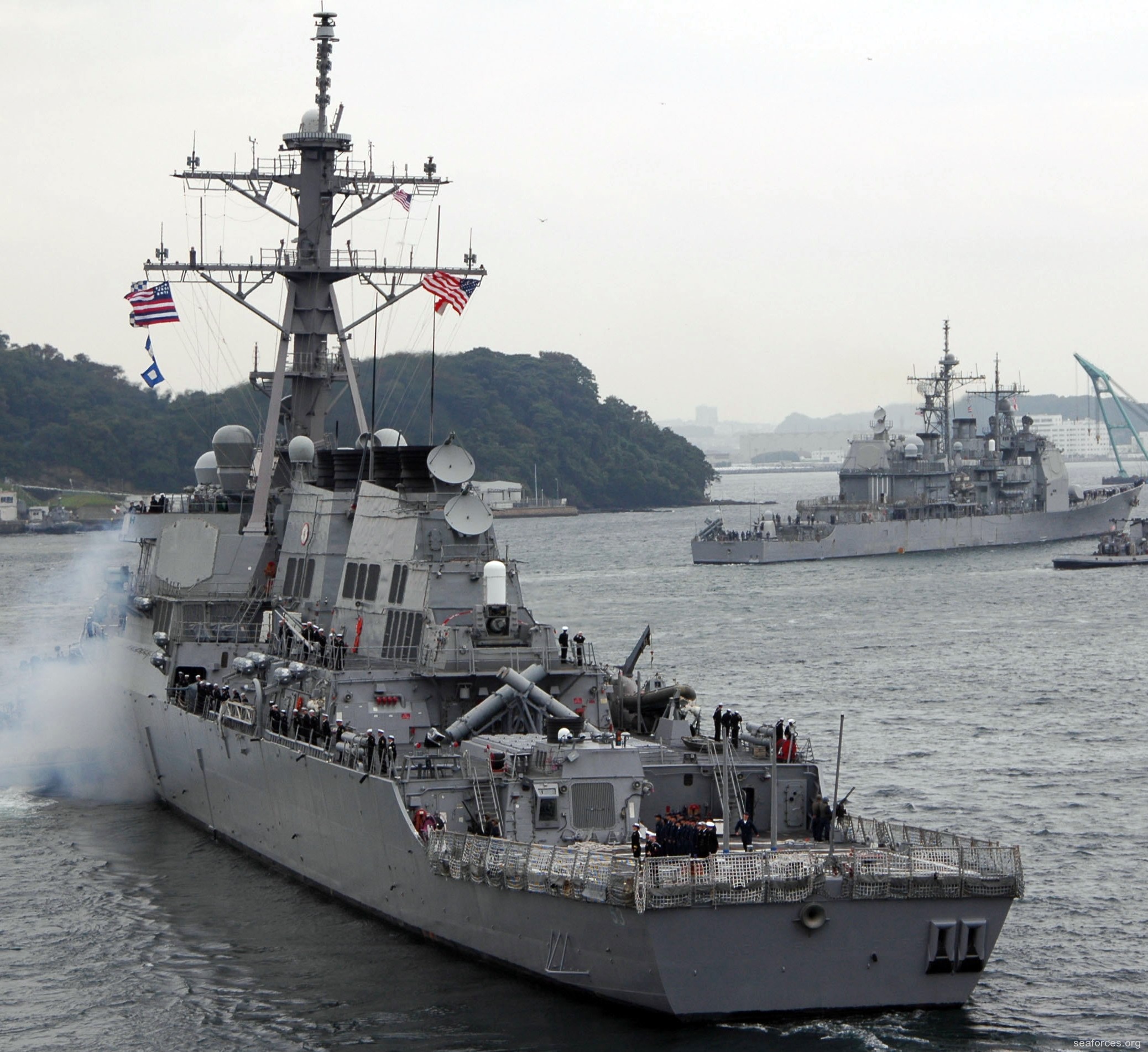 Yokosuka, Japan - October 2005 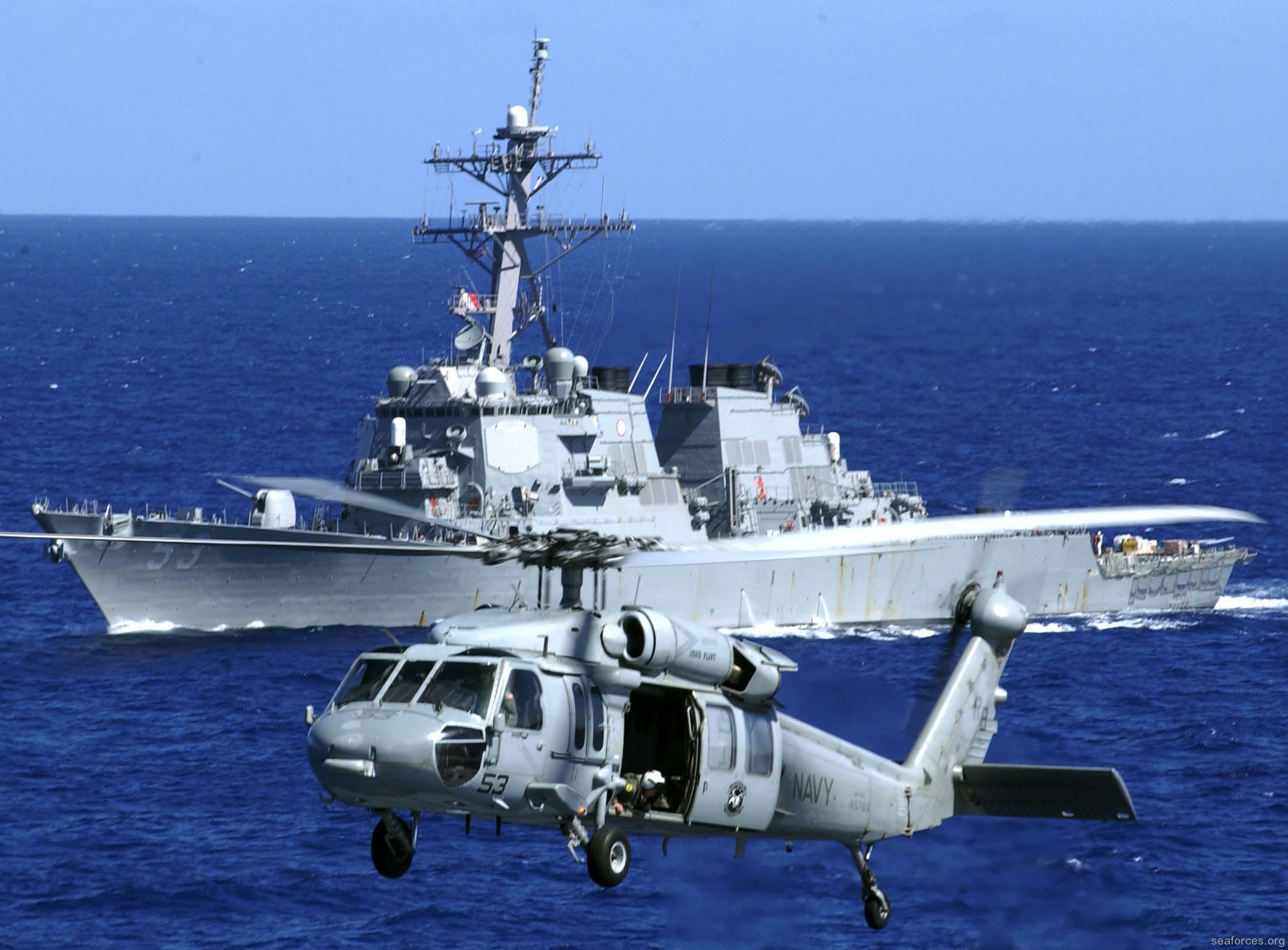 Coral Sea - July 2005 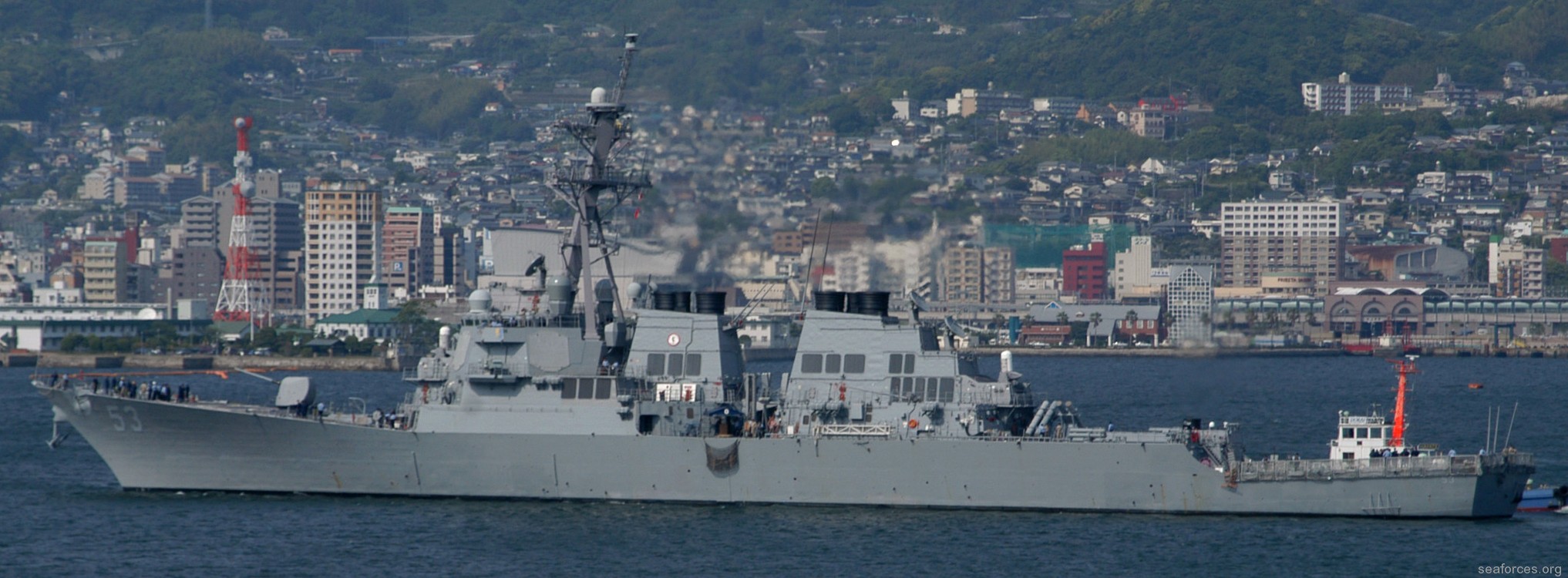 Sasebo, Japan - May 2005 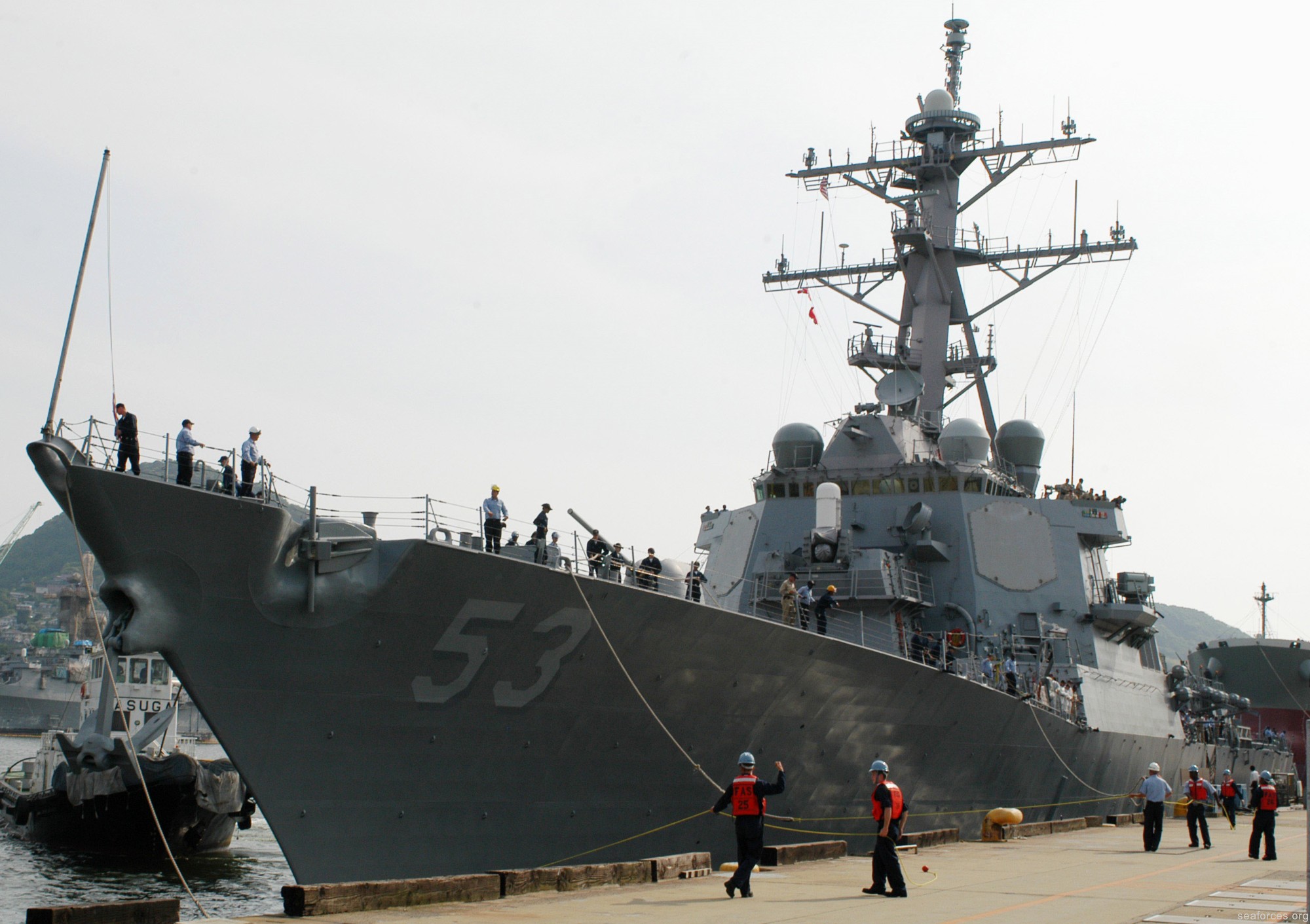 Sasebo, Japan - May 2005 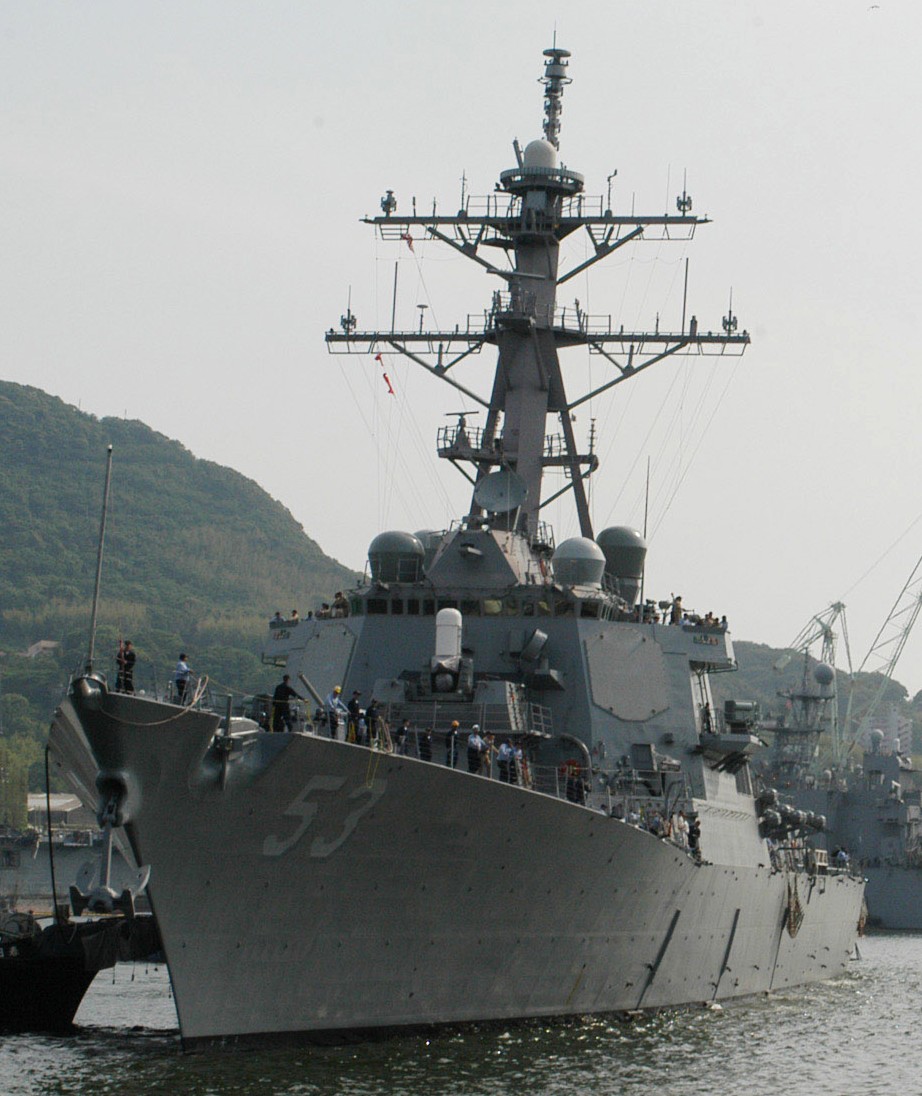 Sasebo, Japan - May 2005 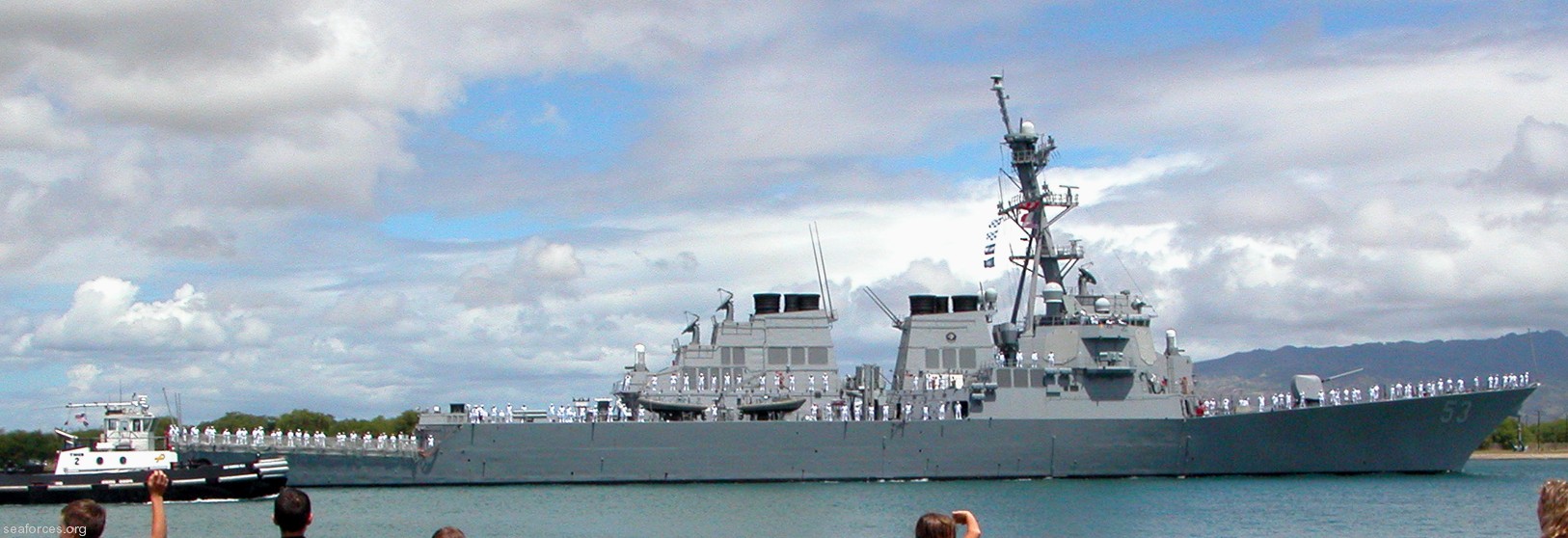 Pearl Harbor, Hawaii - June 2004 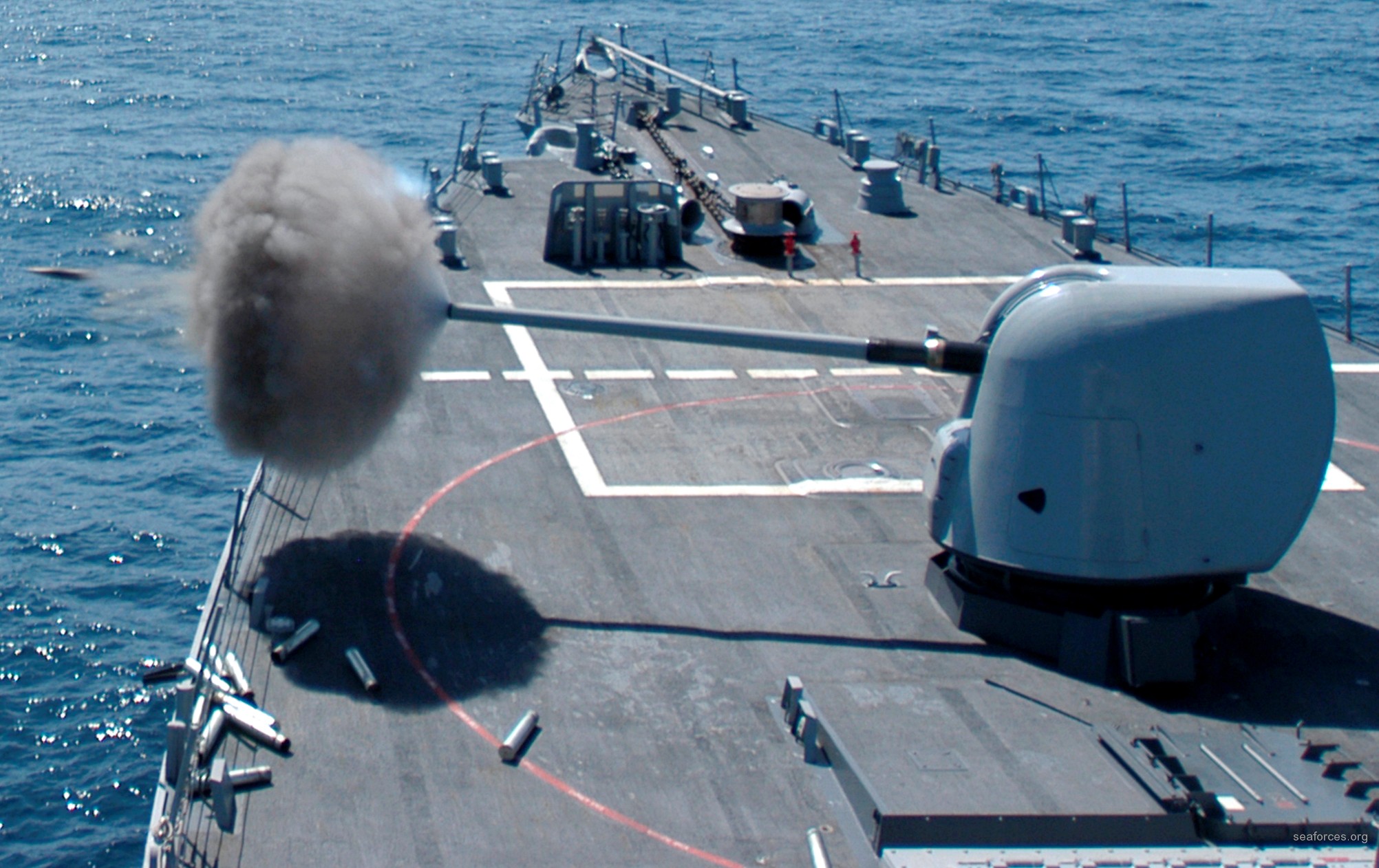 Mk-45 Mod.2 gun fire exercise - Pacific Ocean - August 2003 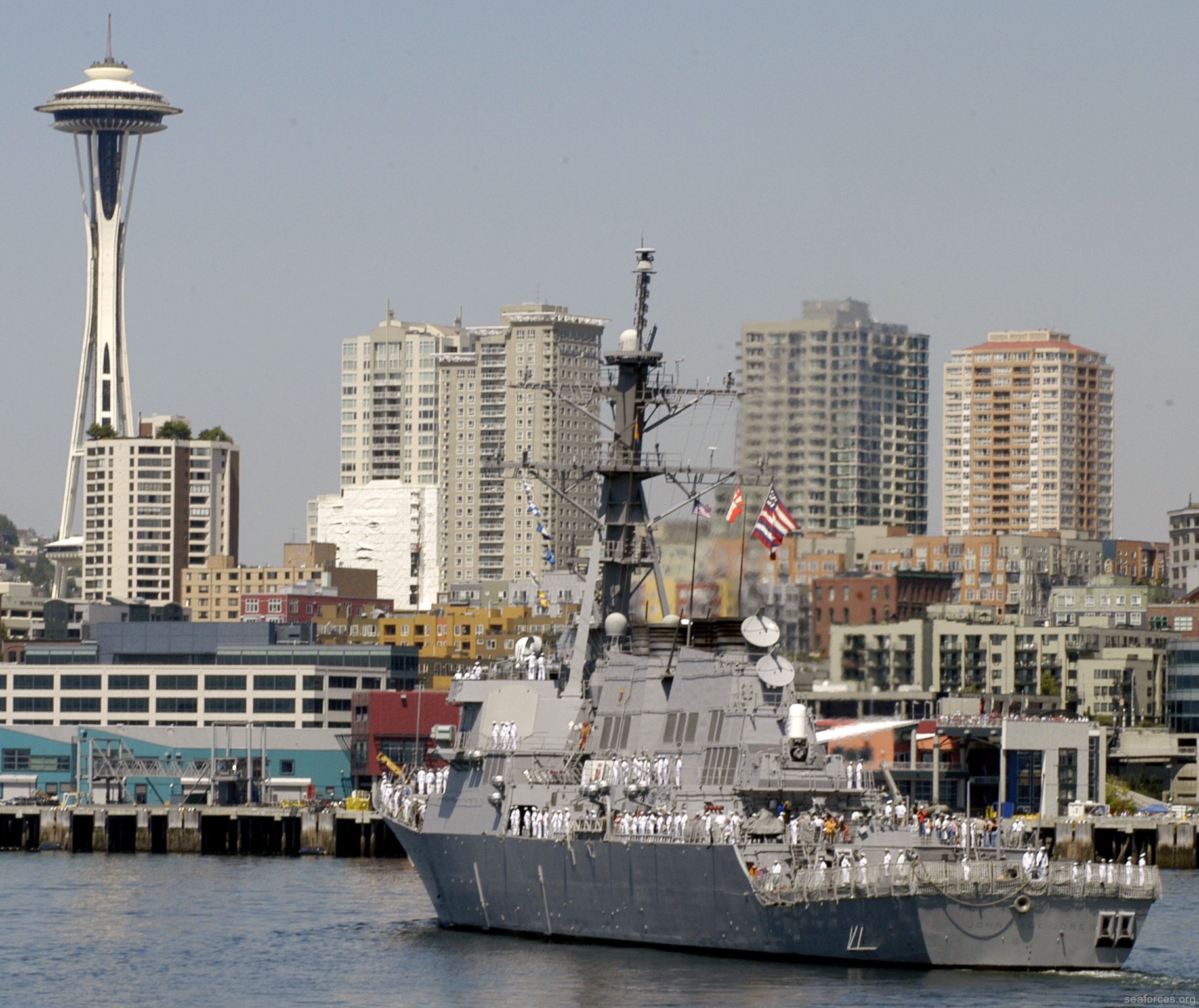 Seattle, Washington - July 2003 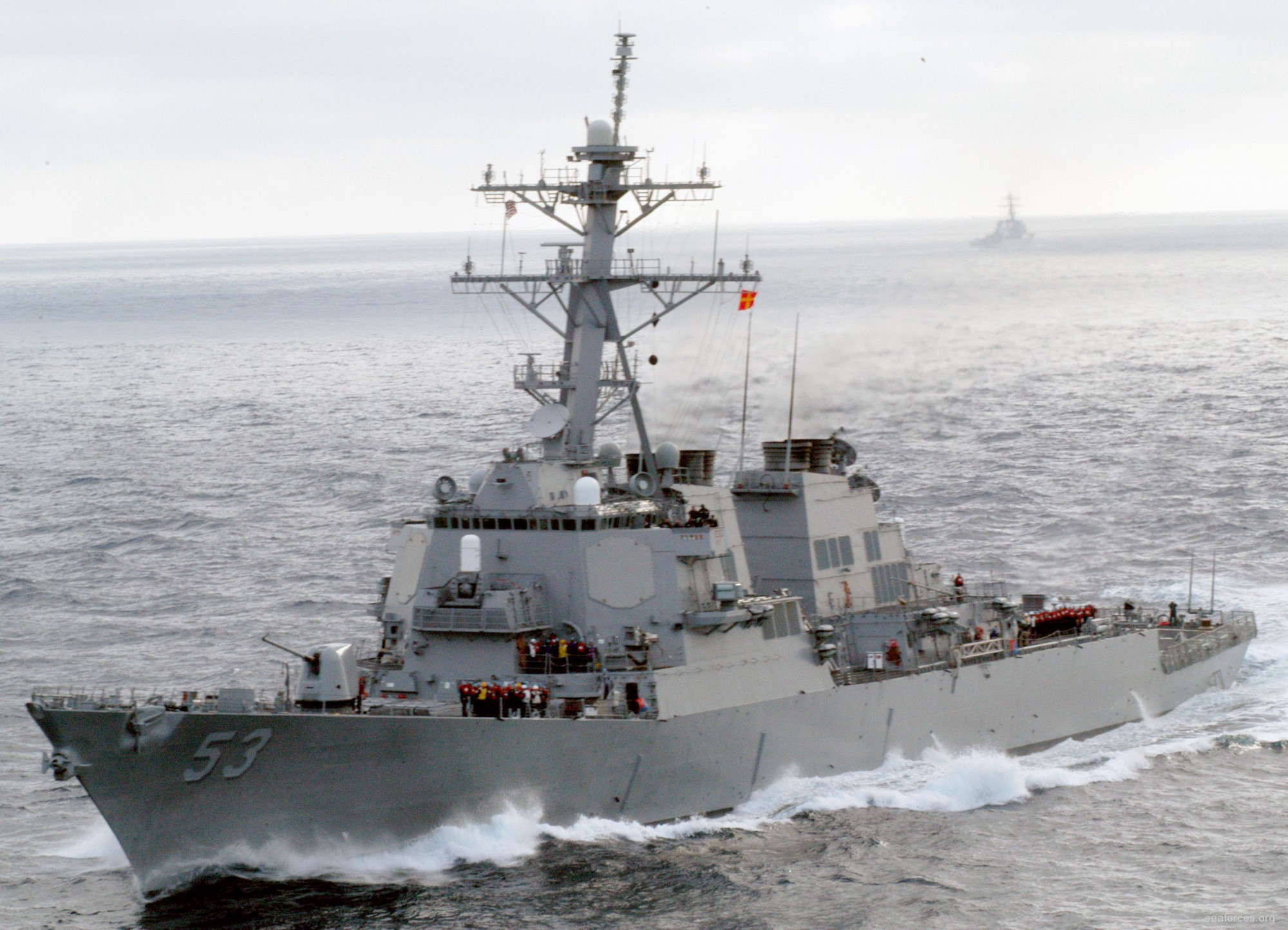 Pacific Ocean - November 2002 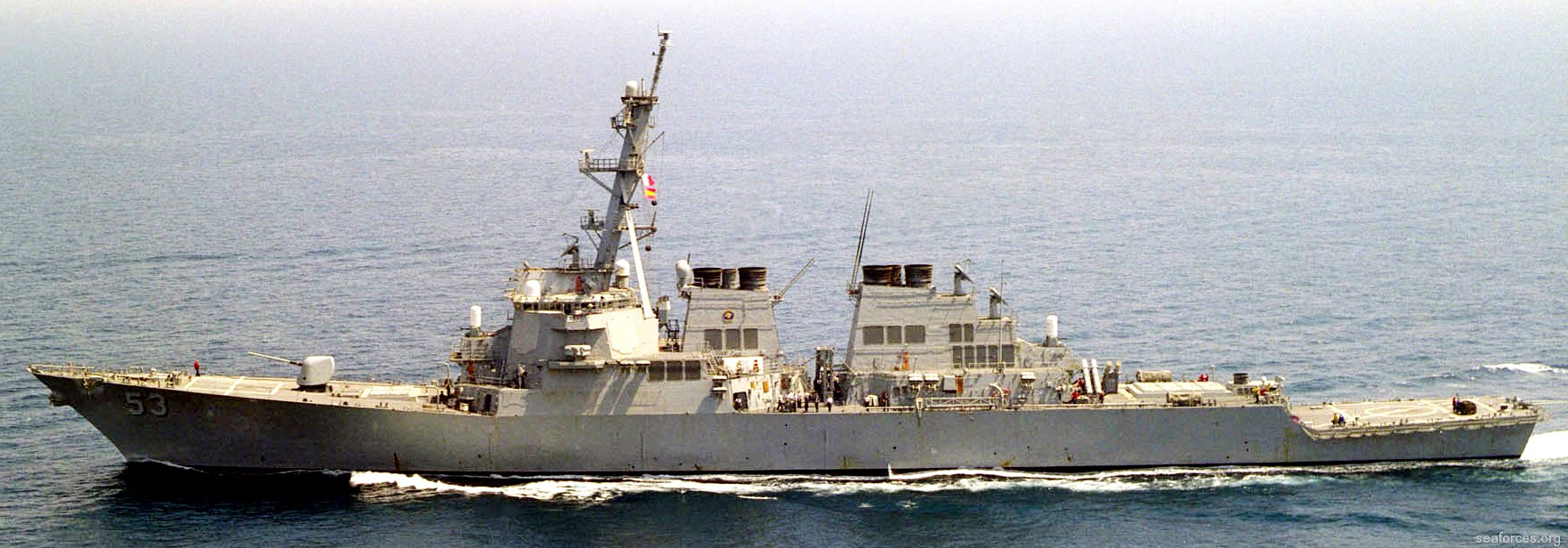 Arabian Gulf - September 2001 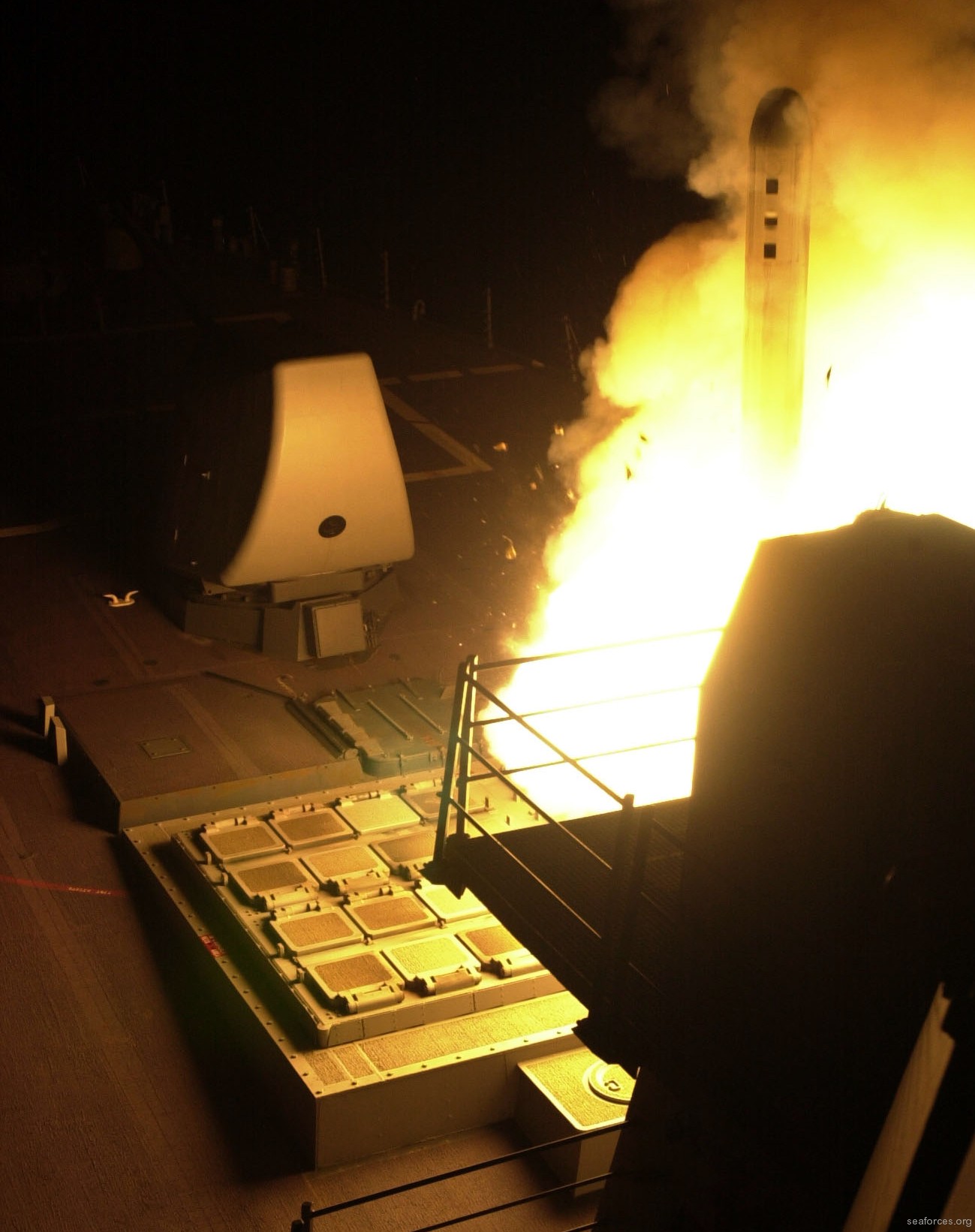 A BGM-109 Tomahawk land attack missile (TLAM) is launched from aboard the guided missile destroyer USS John Paul Jones (DDG 53) in a strike against al Qaida terrorist training camps and military installations of the Taliban regime in Afghanistan on October 8, 2001 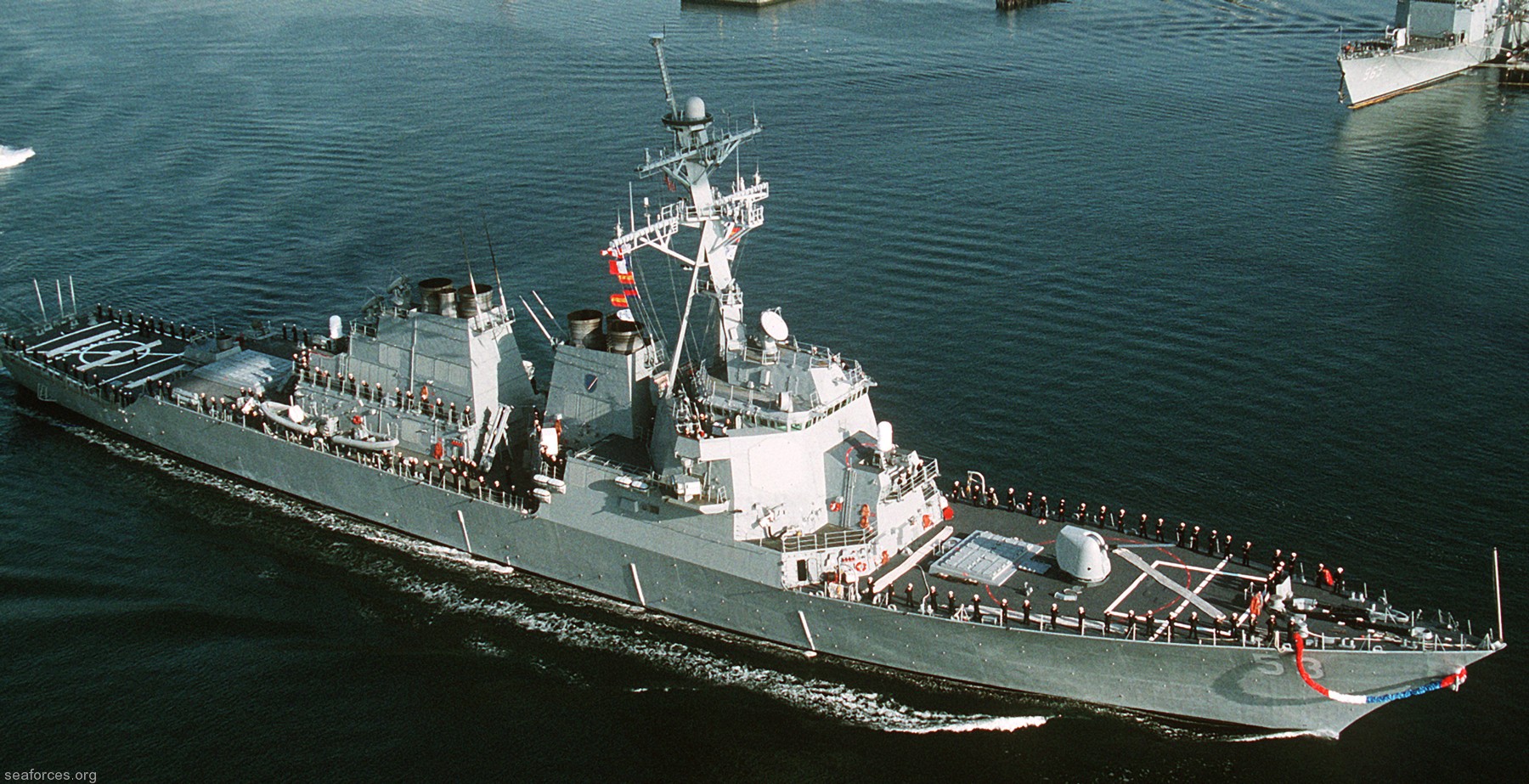 San Diego, California - December 1993 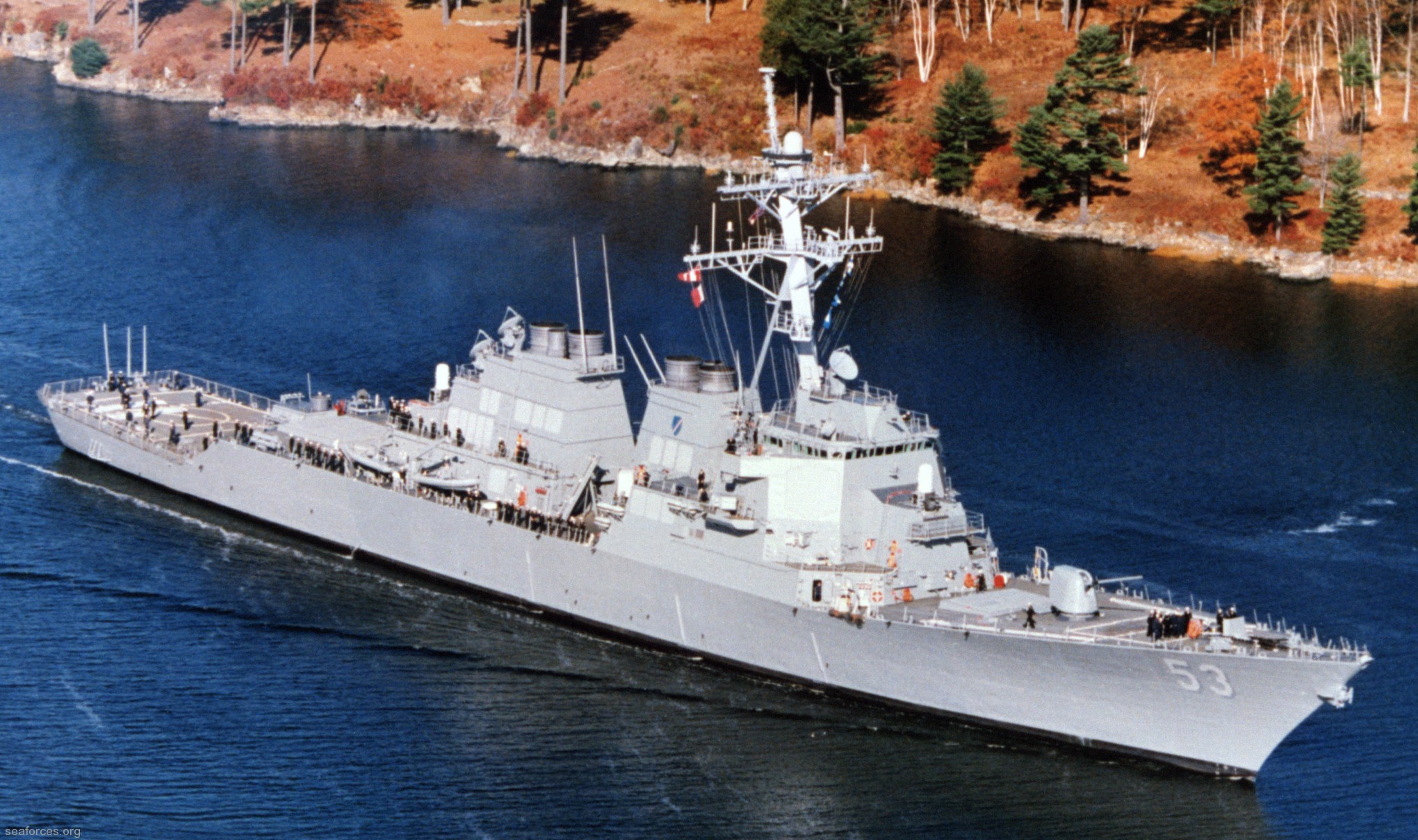 October 1993 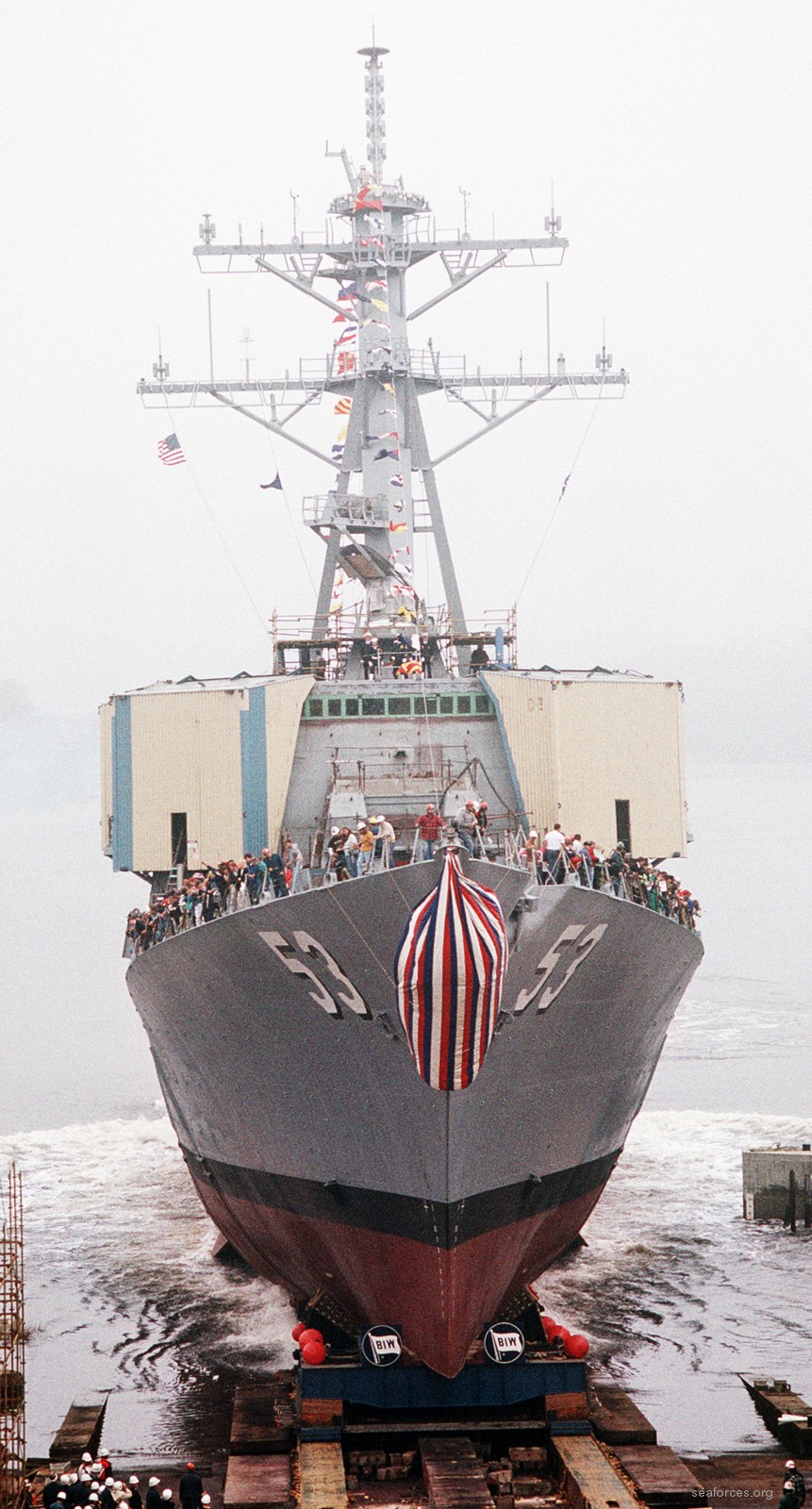 christening & launching ceremony at Bath Iron Works, Maine - October 26, 1991 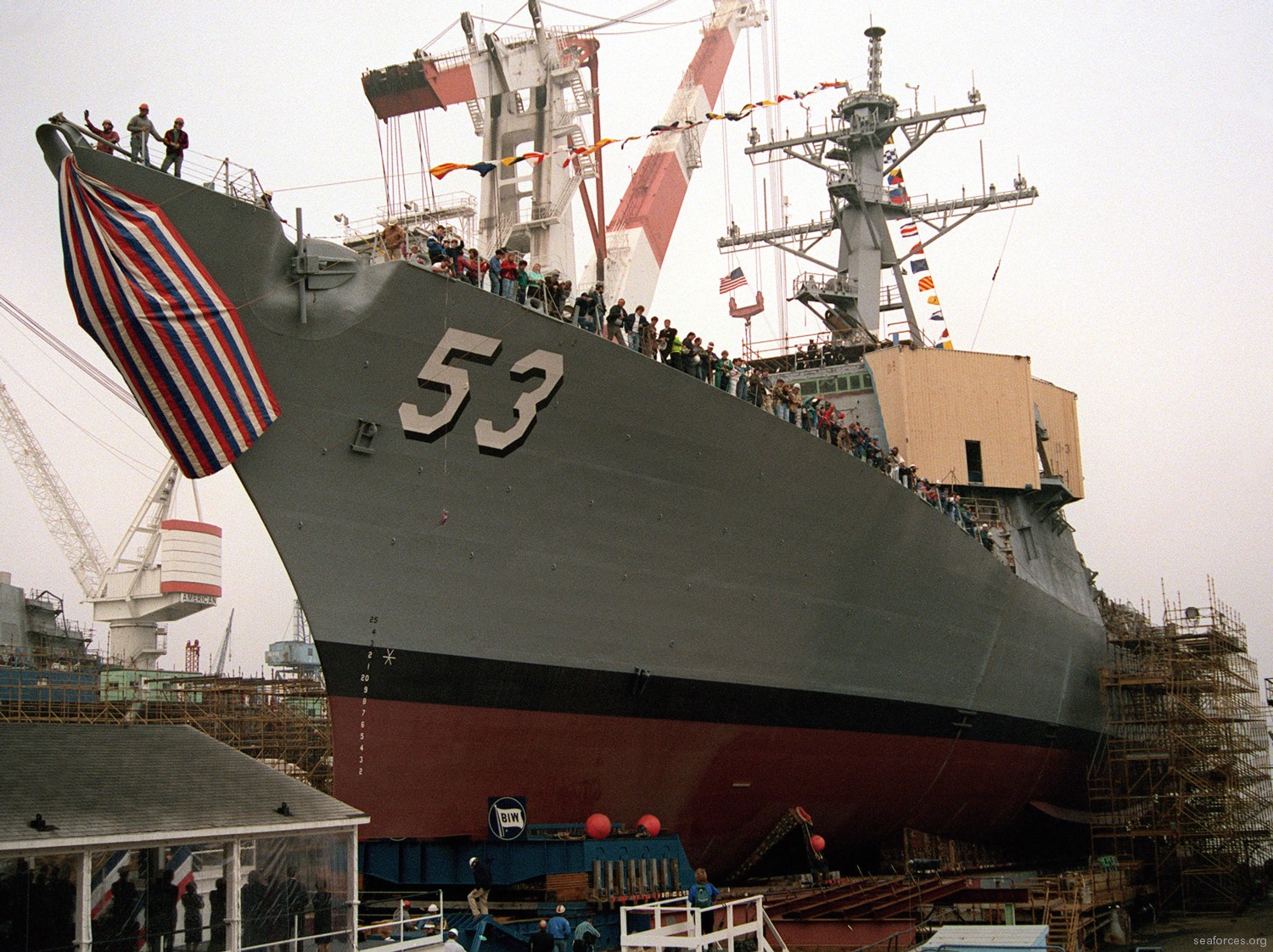 christening & launching ceremony at Bath Iron Works, Maine - October 26, 1991 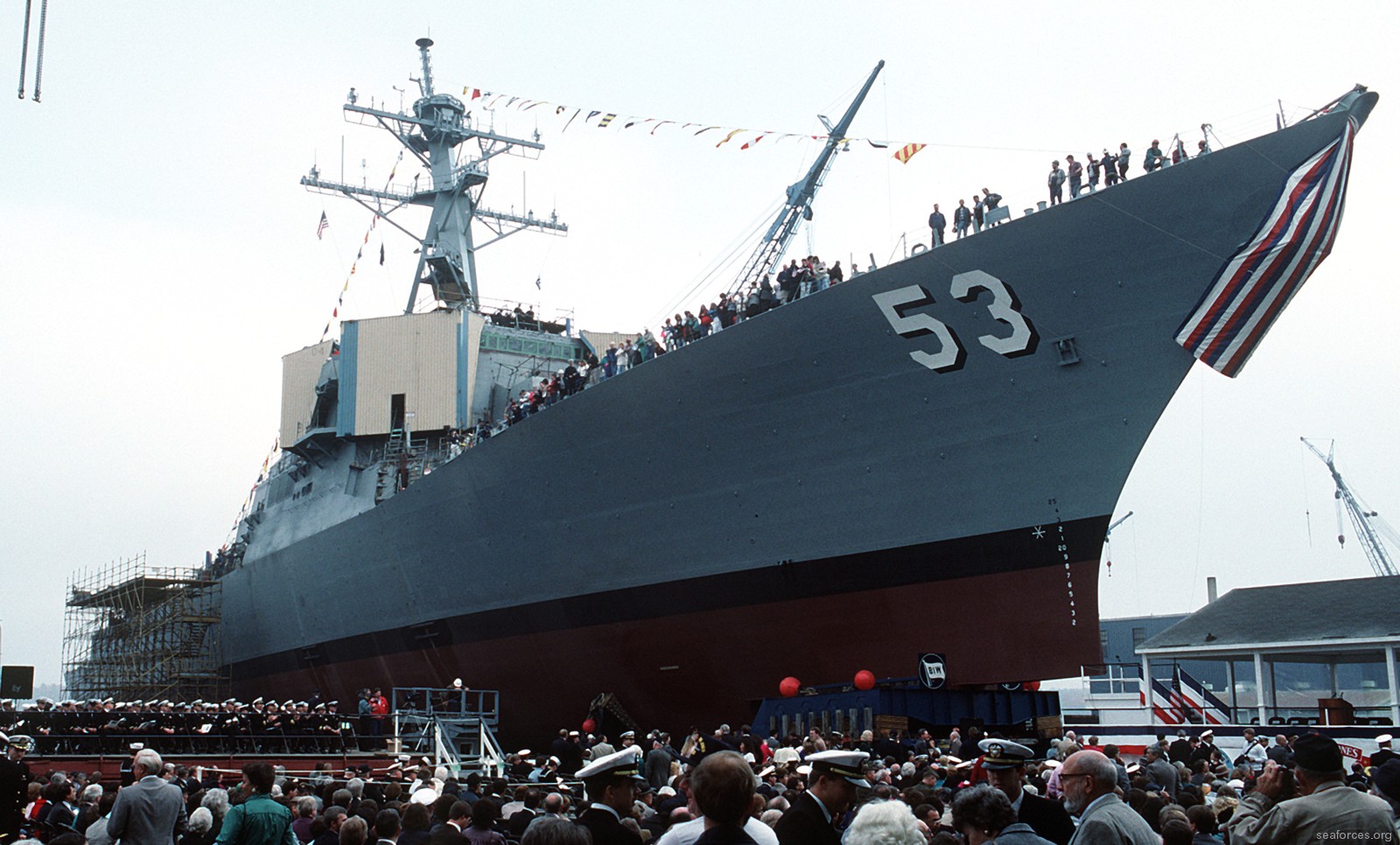 christening & launching ceremony at Bath Iron Works, Maine - October 26, 1991 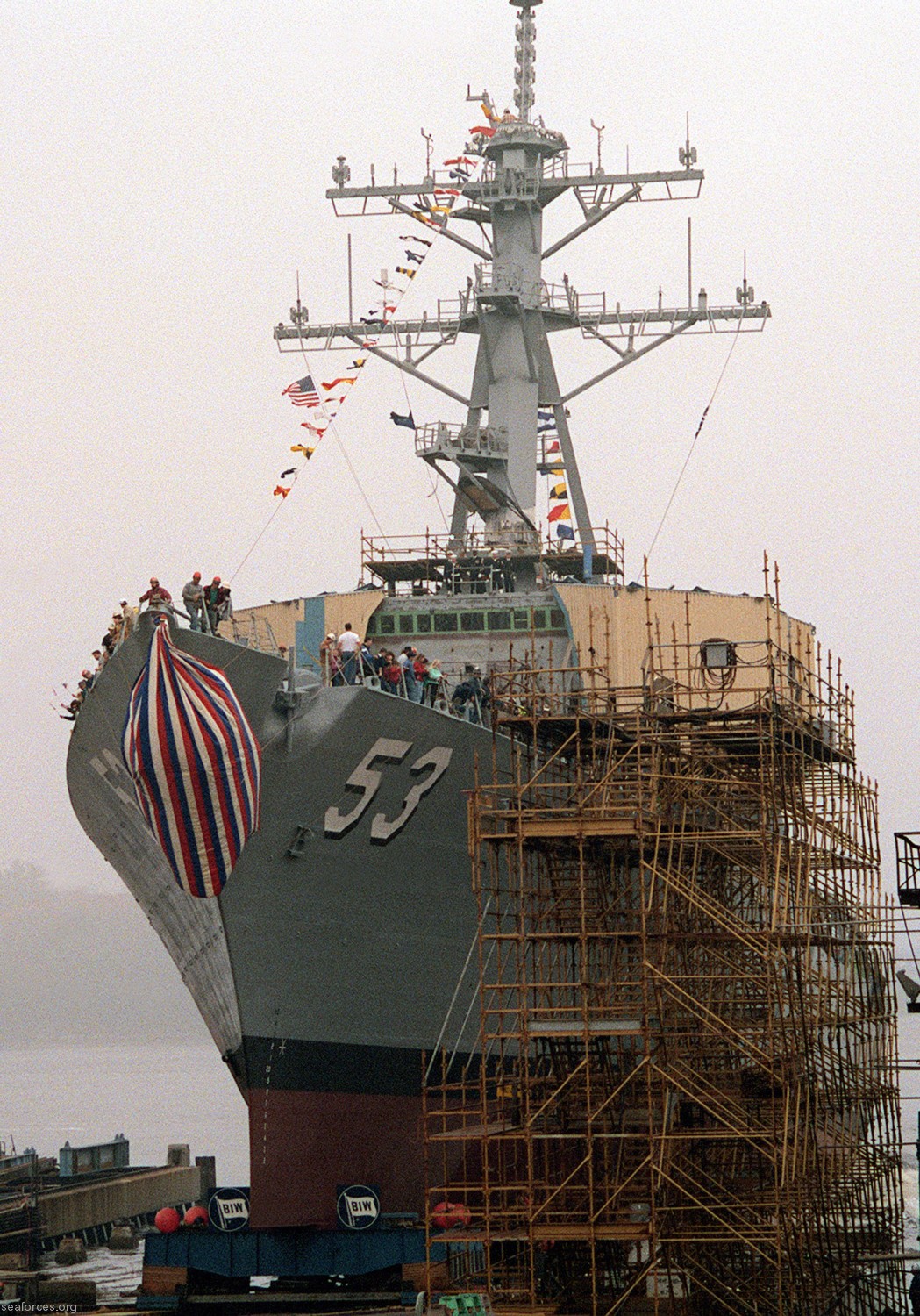 christening & launching ceremony at Bath Iron Works, Maine - October 26, 1991 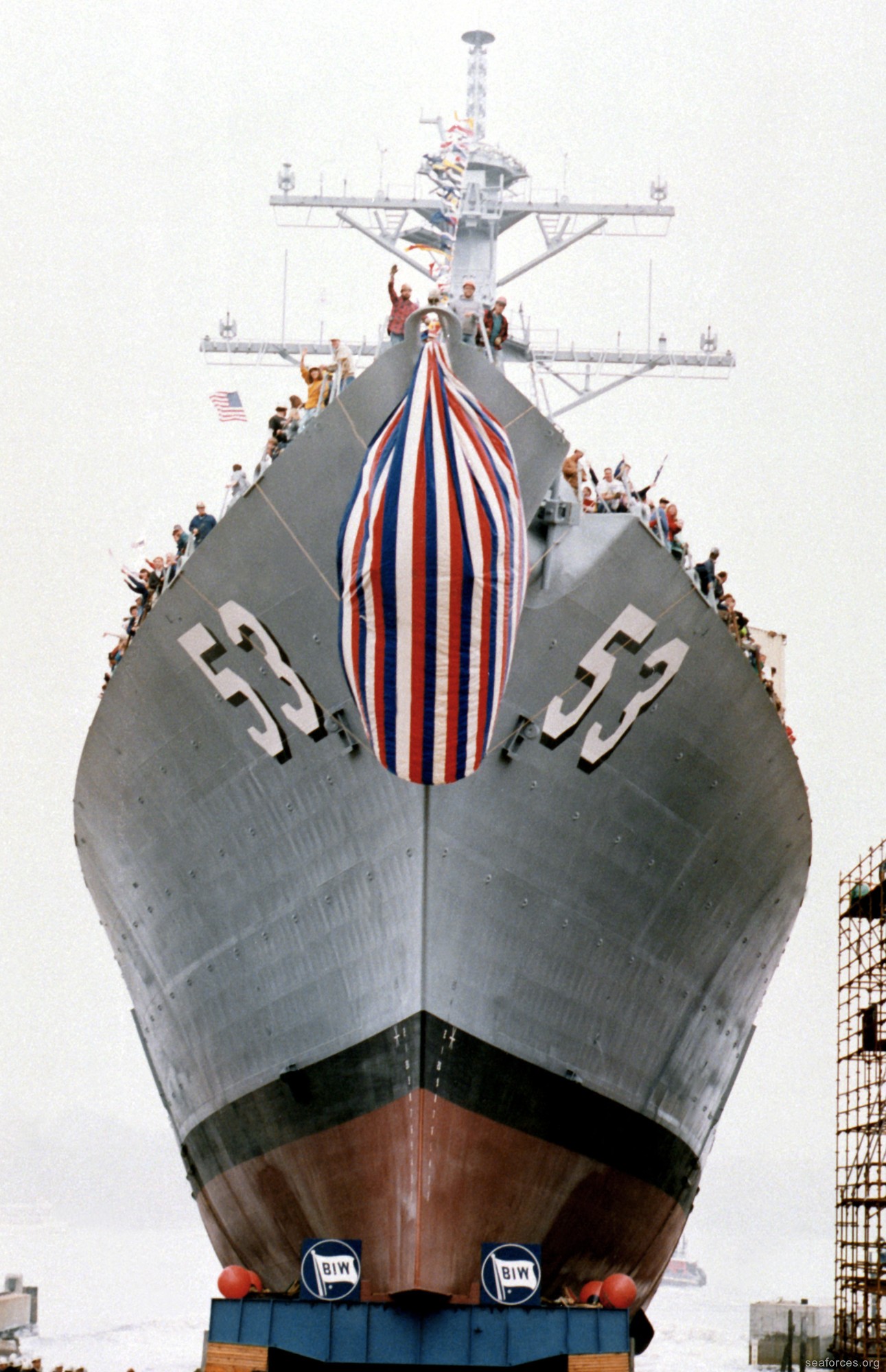 christening & launching ceremony at Bath Iron Works, Maine - October 26, 1991 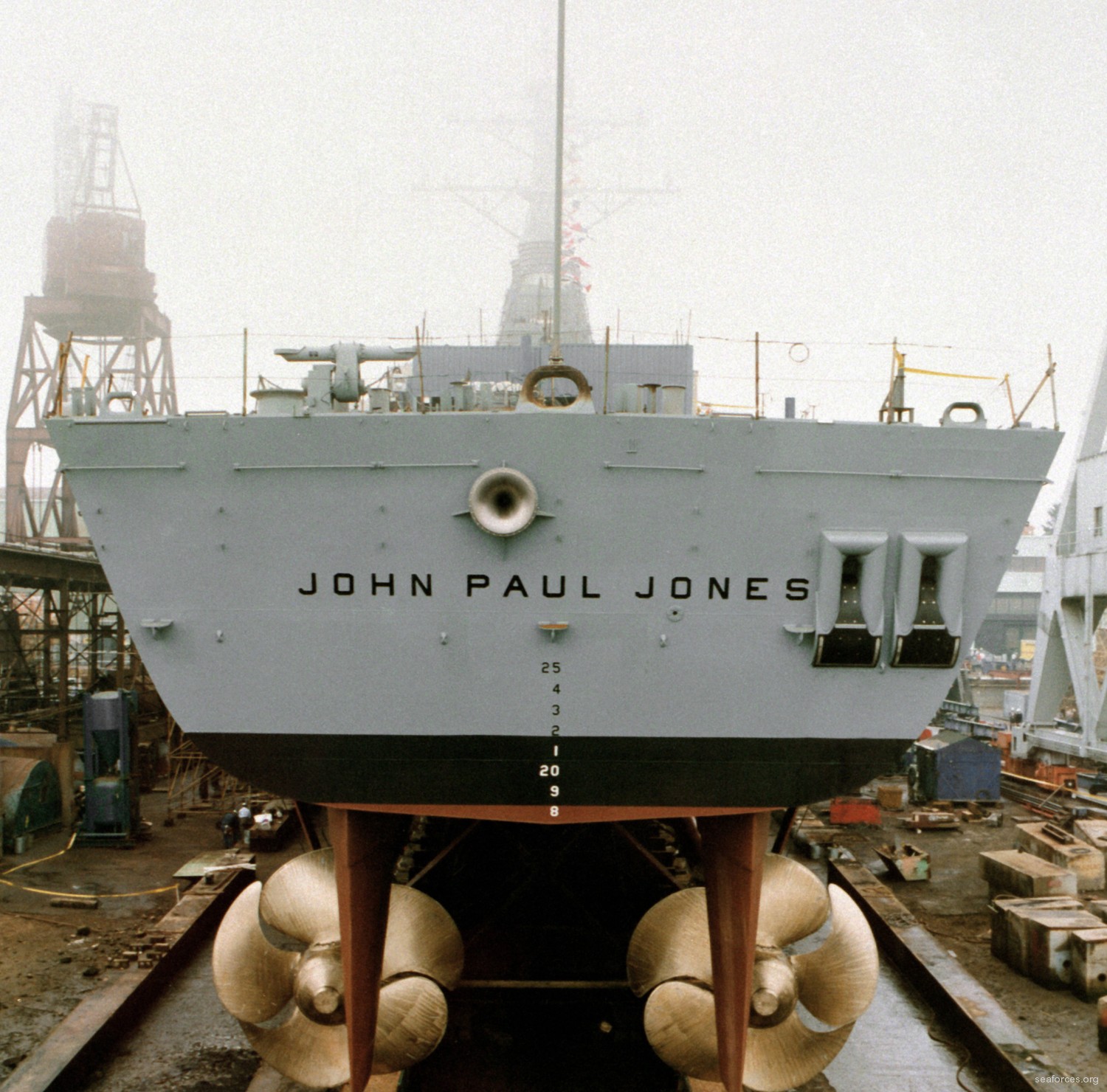 prepared for her christening ceremony - October 25, 1991 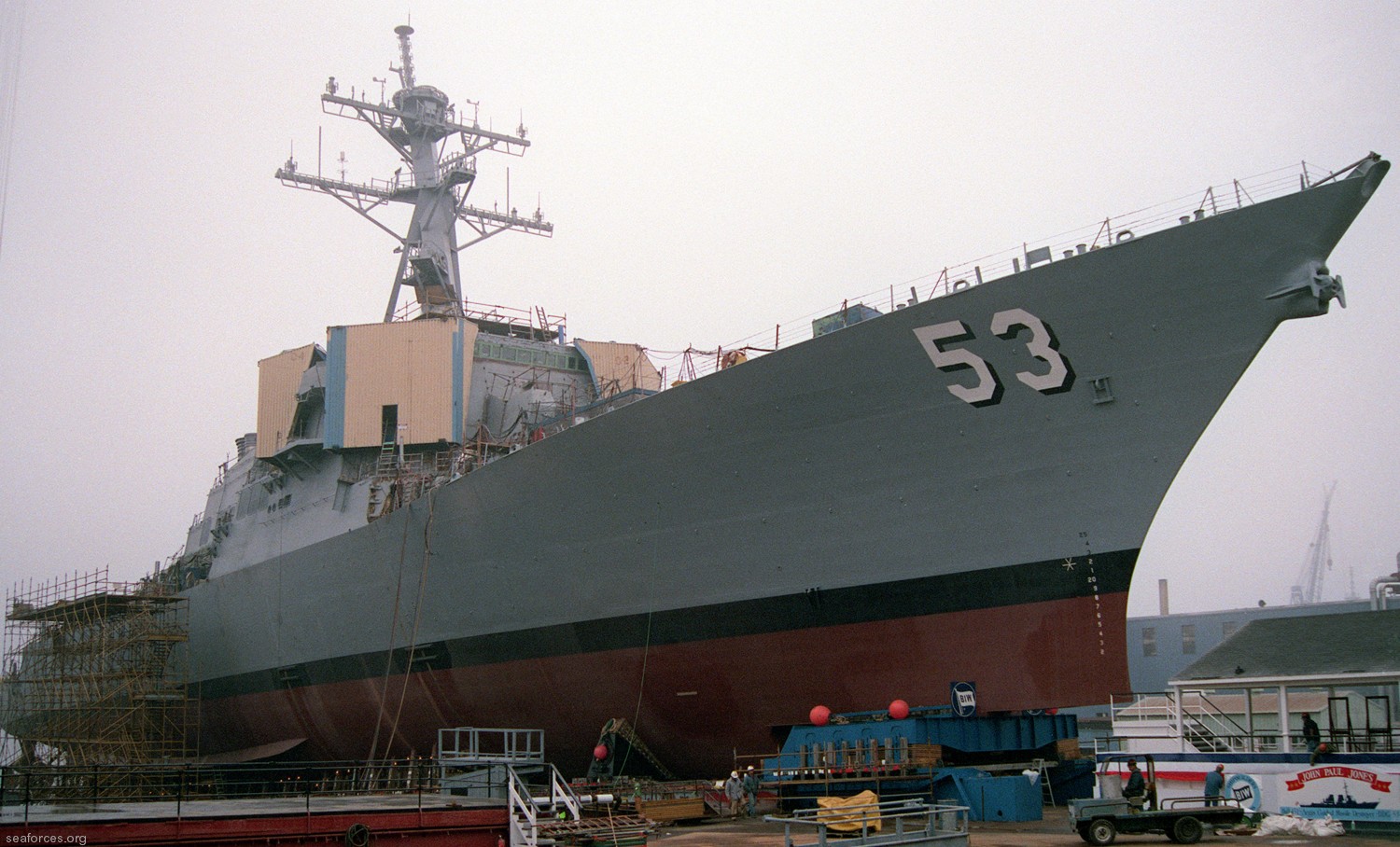 prepared for her christening ceremony - October 25, 1991 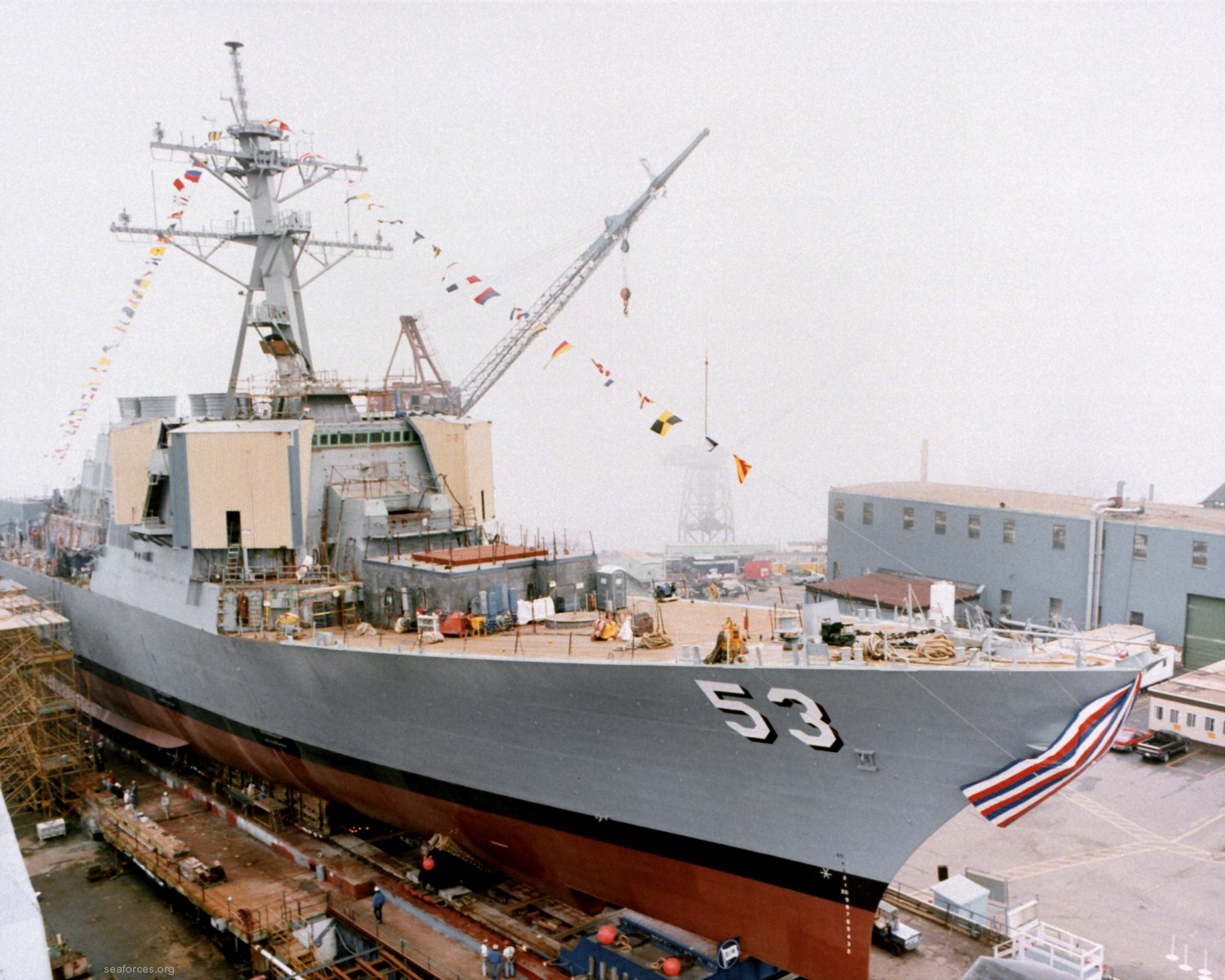 prepared for her christening ceremony - October 25, 1991 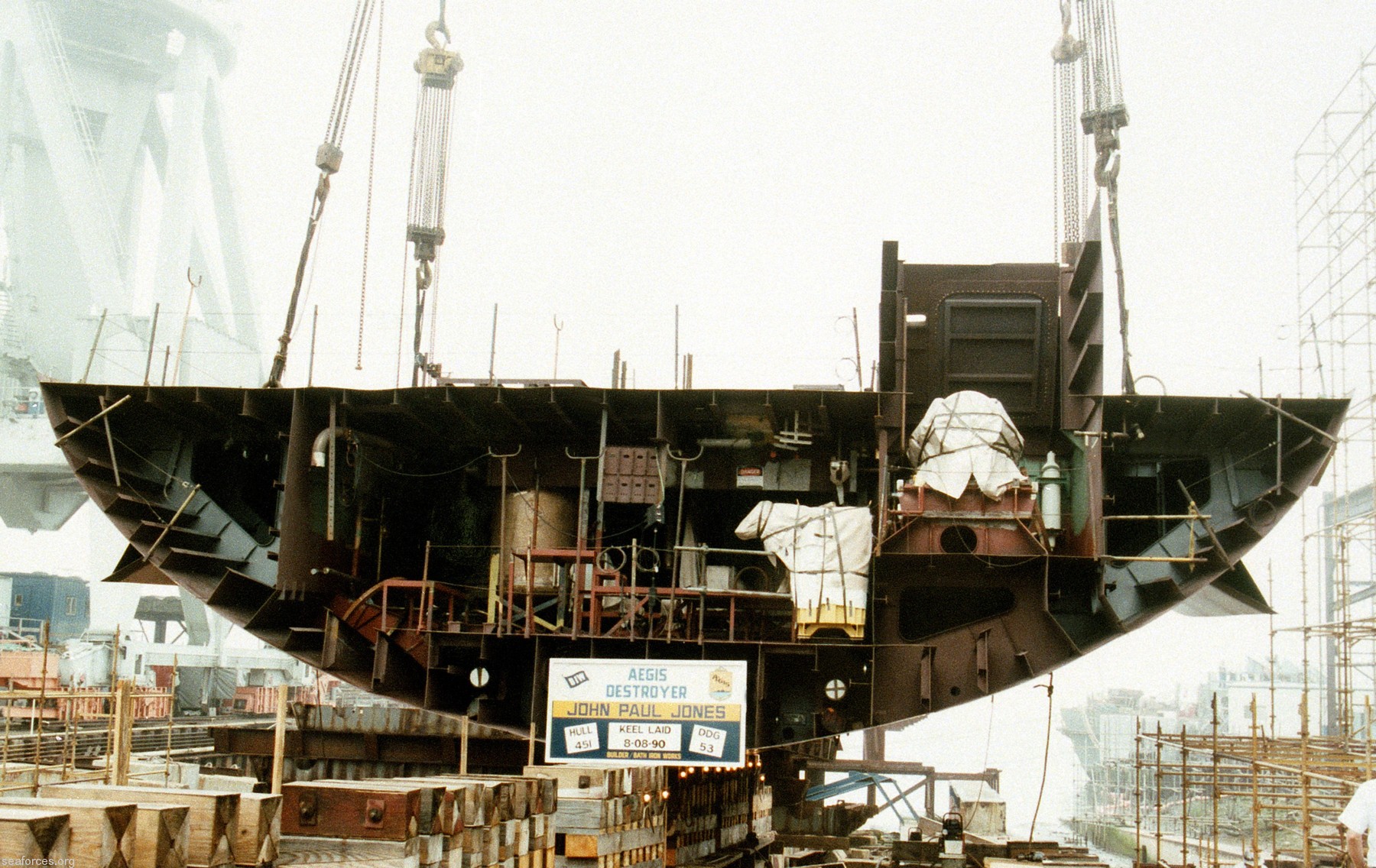 keel laying ceremony at Bath Iron Works, Maine - August 8, 1990 |
||
|
USS John Paul Jones (DDG 53): On 7 October 2001, John Paul Jones launched the first Tomahawk missiles into Afghanistan as part of Operation Enduring Freedom. In June 2010 she began a ten-month yard period during which her machinery control system and many HM&E systems were upgraded. This was a first in class effort, similar to the CG-47 mid life upgrade undertaken on the Ticonderoga hull. On 10 June 2011, she anchored off the coast of Malibu, California at the beginning of a three-day celebration called Navy Days designed to thank the sailors and their families for their service to the country. On 29 November 2011, John Paul Jones was the first ship to deploy after receiving the DDGMOD (HM&E) upgrade. On 1 November 2015, John Paul Jones participated in Campaign Fierce Sentry Flight Test Operational-02 Event 2 (FTO-02 E2), a complex $230 million U.S. military missile defense system test event conducted at Wake Island and the surrounding ocean areas. During the test, the destroyer shot down a simulated anti-ship cruise missile but failed to intercept a medium-range ballistic missile that was launched from a C-17 transport plane. On 18 January 2016, John Paul Jones sank the decommissioned guided-missile frigate Reuben James in a test of a new anti-surface warfare variant of the Raytheon Standard Missile 6 (SM-6), becoming the first ship to sink a ship with the new variant of the missile. John Paul Jones fired the missile on the U.S. Pacific Missile Range near Hawaii. On 3 February 2017, John Paul Jones completed a ballistic missile intercept in a test off the west coast of Hawaii. The test marks the first time that a ballistic missile has been targeted using the Standard Missile-3 (SM-3) Block IIA interceptor. source: wikipedia |
||
|
Captain John Paul Jones (July 6, 1747 - July 18, 1792): John Paul was born at Arbigland, Kirkbean, Kirkcudbright, Scotland, 6 July 1747. Apprenticed to a merchant at age 13, he went to sea in the brig Friendship to learn the art of seamanship. At 21, he received his first command, the brig John. After several successful years as a merchant skipper in the West Indies trade, John Paul emigrated to the British colonies in North America and there added "Jones" to his name. At the outbreak of the American Revolution, Jones was in Virginia. He cast his lot with the rebels, and on 7 December 1775, he was commissioned first lieutenant in the Continental Navy, serving aboard Esek Hopkins' flagship Alfred. As First Lieutenant in Alfred, he was the first to hoist the Grand Union flag on a Continental warship. On 1 November 1777, he commanded the Ranger, sailing for France. Sailing into Quiberon Bay, France, 14 February 1778, Jones and Admiral La Motte Piquet changed gun salutes - the first time that the Stars and Stripes, the flag of the new nation, was officially recognized by a foreign government. Early in 1779, the French King gave Jones an ancient East Indiaman Duc de Duras, which Jones refitted, repaired, and renamed Bon Homme Richard as a compliment to his patron Benjamin Franklin. Commanding four other ships and two French privateers, he sailed 14 August 1779 to raid English shipping. On 23 September 1779, his ship engaged the HMS Serapis in the North Sea off Famborough Head, England. Richard was blasted in the initial broadside the two ships exchanged, losing much of her firepower and many of her gunners. Captain Richard Pearson, commanding Serapis, called out to Jones, asking if he surrendered. Jones' reply: "I have not yet begun to fight!" It was a bloody battle with the two ship literally locked in combat. Sharpshooting Marines and seamen in Richard's tops raked Serapis with gunfire, clearing the weather decks. Jones and his crew tenaciously fought on , even though their ship was sinking beneath them. Finally, Capt. Pearson tore down his colors and Serapis surrendered. Bon Homme Richard sunk the next day and Jones was forced to transfer to Serapis. After the American Revolution, Jones served as a Rear Admiral in the service of Empress Catherine of Russia, but returned to Paris in 1790. He died in Paris at the age of 45 on 18 July 1792. He was buried in St. Louis Cemetery, which belonged to the French royal family. Four years later, France's revolutionary government sold the property and the cemetery was forgotten. In 1845, Col. John H. Sherburne began a campaign to return Jones' remains to the United States. He wrote Secretary of the Navy George Bancroft and requested the body be brought home aboard a ship of the Mediterrean Squadron. Six years later, preliminary arrangements were made, but the plans fell through when several of Jones' Scottish relatives objected. Had they not, another problem would have arisen. Jones was in an unmarked grave and no one knew exactly where that was. American Ambassador Horace Porter began a systematic search for it in 1899. The burial place and Jones' body was discovered in April 1905. President Theodore Roosevelt sent four cruisers to bring it back to the U.S., and these ships were escorted up the Chesapeake Bay by seven battleships. On 26 January 1913, the remains of John Paul Jones were laid to rest in the crypt of the U.S. Naval Academy Chapel in Annapolis, Md. Today, a Marine honor guard stands duty whenever the crypt is open to the public. Public visiting hours are from 9 a.m. to 4 p.m., Mondays through Saturdays, and from 1 p.m. to 4 p.m. on Sundays. source: US Navy
|
||
| patches + more | ||
| | seaforces.org | USN ships start page | |

